Affixes(英语词根词缀)
英语语言学概论-Chapter-5-Morphology(形态学)

• Functional morphemes: prepositions, conjunctions, articles, pronouns. Closed class. 虚词
Chapter 5 Morphology(形态学, 词法学)
Internal structures of words and rules of word formation
careful wonderful successful beautiful widen deepen shorten fasten sharpen Impossible, incorrect, improper, illegal, report, import export transport support porter respect inspect expect suspect prospect boys girls toys books tables bottles working, thinking speaking, cutting, hitting the, to,for,bird, leg, air, captain. suffixes,prefixes,roots,inflectional suffixes,free root
5.1 what is morphology
• Morphology studies the internal structures(内部结构) of words and word formation rules. It divided into two fields:inflectional morphology(屈折词法) and derivational/lexical morphology(派 生词法). It studies the different categories of morphemes( bound, free, derivational and inflectional) morphological rules
大学英语常用词根词缀
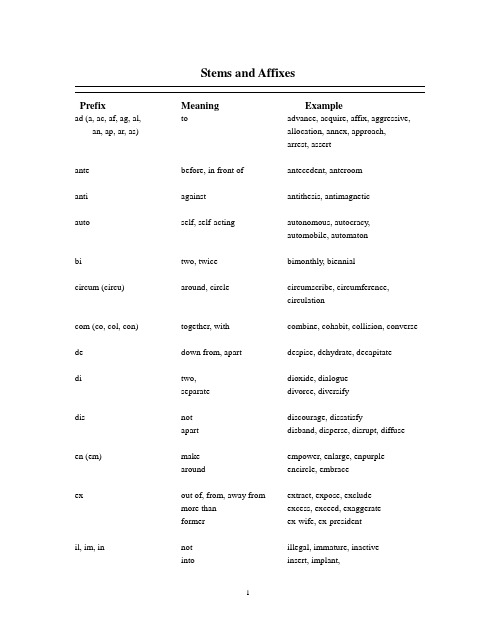
Stems and AffixesPrefix Meaning Examplead (a, ac, af, ag, al, to advance, acquire, affix, aggressive, an, ap, ar, as) allocation, annex, approach,arrest, assertante before, in front of antecedent, anteroomanti against antithesis, antimagneticauto self, self-acting autonomous, autocracy,automobile, automatonbi two, twice bimonthly, biennialcircum (circu) around, circle circumscribe, circumference,circulationcom (co, col, con) together, with combine, cohabit, collision, converse de down from, apart despise, dehydrate, decapitatedi two, dioxide, dialogueseparate divorce, diversifydis not discourage, dissatisfyapart disband, disperse, disrupt, diffuseen (em) make empower, enlarge, enpurplearound encircle, embraceex out of, from, away from extract, expose, excludemore than excess, exceed, exaggerateformer ex-wife, ex-presidentil, im, in not illegal, immature, inactiveinto insert, implant,inter, intro, intra, intel between, inside, within, interrupt, interpose,inward, into introvert, introspectintramural, intracellular,intracity, intelligible,intellectkilo thousand kilometer, kilogrammal bad, badly malfunction, maladaptation,malaria, malapplymacro great macrocosm, macrostructure micro small, tiny microcosm, microstructuremis wrong(ly) misbehave, mismanagebad misfortune, mischancemono one, single, alone monocracy, monotonous,multi many, much multilateral, multipurposemultiply, multilingualnon not, without nonstop, nonsticking, nonattackingob (有变体) against, not clear, object, opaque, offend,opposite obtriangular, obpyramidalover more than overestimate, overchargeper through pervious, pervadeperennial, perforatepre before prearranged, previouspro forward prospect, projector, progressfor, in favor of pro-slavery,popul, publ people population, populace, popularity,public, publicize, publishre back , again reload, retrace, return, response semi half, partly semicircle, semifinalretro back, backward retrospect,stereo solid, three dimensional stereophone, stereoanalysisstereochemistrysub(suf, sug, sup, sus, sur) under, below, lower submerge, subtitle, subeditorsuffer, suggest, surroundingsuspend,syl, sym, syn together, the same syllabus, syllogism, symphonysymmetry, synthetic, synchronizetele far away telescope, telecast, telelectureteleconversationtrans across transport, transfer, transparentbeyond transonic, transnormalultra excessive, extreme ultramodern, ultravioletup upward, in an upward upright, upstreamdirection upheaval, upgradeun not unqualified, unloadunder below, beneath, under undergo, underestimate, undertakeundermineuni one universe, unify, unilateral, uniformNoun suffix Meaning Exampleship 关系, 状态, 身份relationship, kingship,资格, 技巧, 技能apprenticeship, horsemanship总人数penmanship, membership, readershiphood 状态, 性质, 集体, falsehood, bachelorhood,时期orphanhood, maidenhood,neighborhoodfold time(s) manifold, millionfoldage state advantage, heritageplace village, anchorage,amount mileage, carriage, postage, portageian one who magician, physicianant one who assistant, inhabitantee one who trainee, intervieweeiot one who patriot, compatriot,aut one who astronaut, aquanauter, ar, or, one who writer, navigator,ist one who pianist, economist,tude state of latitude, altitude, attitude, longitude (t)ure state of mixture, departureal state of renewal, withdrawalance, ence state of importance, interference,cy, ency state of infancy, tendencyness state of carefulness, consciousnesstion, sion state of solution, reduction, permission, ment state of rearmament, equipment,ty, ity state of density, purity, moralityology study of theology, psychologyism doctrine of egoism, socialismery, ory, ary place winery, gallery, observatory, granarycollection of dictionary, directory,Verb Suffix Meaning Exampleate make or cause to happen create, evacuateen make or cause to happen shorten, heightenify make or cause to happen glorify, certify, rectify, notify,ize make or cause to happen modernize, publicize, polularizeAdjective Suffix Meaning Exampleable, ible capable of edible, convertible, unreadableful full of beautiful, gracefulhandful, cupful, armfulless without hopeless, limitlessal having the nature of cultural, economicalant, ent having the nature of pleasant, dependent,ish having the nature of foolish, childishive having the nature of expensive, responsive, indicative ly having the nature of lovely, livelyed, ing having the nature of excited, interestingous, having the nature of glorious, prosperousy having the nature of tasty, windy, dusty, dirtyary, ory having the nature of elementary, primary, introductory,contradictoryAdverb Suffix Meaning Examplely in a certain manner slowly, happilyward in the direction of westward, homewardwise in the direction of clockwise, counterclockwiseRoots Meaning Exampleann, enn year anniversary, annual, perennial aqua water aquarium, aquatel, aqueduct arch chief patriarch, matriarchmonarchy, anarchyastro space astronaut, astrophysics, astrometry aud(i) listen, hear audiometer, auditor, auditoriumauto self autograph, automation,car autocide, autoworkeravia bird, fly avian, aviator, aviarybibli book bibliography, Biblebio life autobiography, bio-weapon,cand light candle, incandescent, candid,cap(it) head captain, decapitate, capsizecast throw broadcast, telecastcent hundred century, centigrade, centimeter chron time synchronize, chronologicaldec ten decade, Decemberdem people democracy, epidemicdict, say dictation, predictdon give donate, pardon, doneeduct, duce lead, direct conduct, reduce, deduct, aqueduct ego sels egoist, egocentric, egomaniacfer take, carry transfer, confer, defer, circumferencerefer, preferflect, flex bend reflect, inflect, circumflex, flexiblegene begin genesis, autogenous, degenerateregenerategeo the earth geography, geometrygrad, gres step gradually, degradationregress, aggressivegram, graph write telegram, diagram,stereograph, autographhomo same homonym, homosexual, homogenoushydr water hydroscope, hydroaeroplanelog study theology, biologyword logic, dialogue, cataloguelumin light illuminate, lustremagna, magni great, big, large magnitude, magnate,magnanimous, magnifierman, mana, hand manacle, manuscriptmanu, main, manipulate, maintainmatri mother matrimony, matriarch, matrifocal metr, meter measure thermometer, astrometry, barometer mit, miss send permit, transmit, submissionopt eye, light optical, optics, optophone,optometristpat, pathy disease pathos, pathology,feeling telepathy, theopathetic, apathypatri father compatriot, patriarchpel, pul drive compel, compulsory, expel,dispel, repel, propellorpend hang pending, suspension,appendix, pendulumpay spend, expensivephon sound stereophonic, microphonepoly many polyester,port carry transport, import, exportpose place depose, opposition, compose,interposepsych soul or mind psychopath, psychologyrot turn, wheel rotate, circumrotaterupt break, burst disrupt, corrupt, interrupe scribe, scrip write transcribe, transcript, circumscribe scope see microscope, telescopesect cut dissect, vivisection, transect, sector sens, sent feel, think consent, resent, dissentspect, spise see inspect, circumspect, despisespir(e) breathe inspire, expire, conspiretain, tin hold retain, maintain, attain, continue the god theology, theocracy, monotheismthermo heat thermometer, thermostat,thermochemistrytribut give contribute, tributary, attributevac empty evacuate, vacation,vacuous, vacuumvert, vers, change converse, revert, diversifyvis, vise, vision see supervise, television,vig, vit, viv life vigorous, revitalize, revive, vivify vol, vor turn involve, volume, vortex, divorce,。
构词法-affix

表示其他意思的前缀
前缀 transsemiviceunibi半 副 单 双 意义 跨越;移 transport(运输) semi-final(半决赛) vice-premier(副总理) uniform(制服) bicycle(自行车) 例 子 translate(翻译) semiconductor(半导 体) vice-chairman(副主 席) unilateral(单方面的) bimonthly(双月的)
Word-formation 构词法
构 词 法 知 识
Derivation派生法 Compound 合成法
Conversion 转化法
Clipping截成法 Blending 混合词
Acronym 缩略词
1.派生法综述
一、派生法(Derivation) 在一个词的词根(root)前面或后面加上某个词缀(affix) 来产生新词,这种构词法称为派生法(derivation)或词缀 法(affixation)。加在前面的词缀叫前缀(prefix),加在 后面的词缀叫后缀(suffix)。一般情况下,前缀往往改变 词根的词义,不改变词根的词性;而后缀往往改变词根的 词性,有些也涉及意义的变化。大部分前缀和后缀都有固 定的意义,因而许多派生词的词义可以通过词根及词缀的 意思推知。
后缀例子ableiblesuitable适合的natural天然的powerful强大的fearless无畏的responsible负责的national国家的acceptable可接受的personal个人的colorful多彩的helpless无助的alfulfaithful忠诚的lessuseless无用的后缀法形容词后缀后缀ish例子selfish自私的childish幼稚的bookish书呆子气的native本国的ivecollective集体的famous著名的historic有历史意义的friendly友好的decisive决定性的continuous连续不断的scientific科学的electronic电子的ousdelicious可口的iclylively活泼的lovely可爱的后缀法形容词后缀后缀ty例子thirsty口渴的pleasant令人愉快的secondary次要的golden金色的noisy喧闹的dependent依赖的different不同healthy健康的entant的aryimaginary想象中的wooden木制的ordinary普通的woolen毛纺的en后缀法副词后缀3
高二英语专业术语练习题40题

高二英语专业术语练习题40题1.The construction “be doing” indicates _____.A.present continuous tenseB.past perfect tenseC.future perfect tenseD.present perfect continuous tense答案:A。
“be doing”是现在进行时态的结构,表示正在进行的动作。
B 过去完成时结构是“had done”;C 将来完成时结构是“will have done”;D 现在完成进行时结构是“have/has been doing”。
2.The form “have/has done” represents _____.A.present continuous tenseB.past perfect tenseC.present perfect tenseD.past continuous tense答案:C。
“have/has done”是现在完成时态的结构,表示过去发生的动作对现在造成的影响。
A 现在进行时结构是“be doing”;B 过去完成时结构是“had done”;D 过去进行时结构是“was/were doing”。
3.The structure “had done” shows _____.A.present continuous tenseB.past perfect tenseC.present perfect tenseD.past continuous tense答案:B。
“had done”是过去完成时态的结构,表示在过去某个时间之前已经完成的动作。
A 现在进行时结构是“be doing”;C 现在完成时结构是“have/has done”;D 过去进行时结构是“was/were doing”。
4.The expression “was/were doing” indicates _____.A.present continuous tenseB.past perfect tenseC.present perfect tenseD.past continuous tense答案:D。
Basic Concepts of Words and Vocabulary 英语词汇详细知识点

Basic Concepts of Words and VocabularyWhat is lexicology?☐Lexicology is a branch of linguistics concerned with the study of the vocabulary of a given language. It deals with words, their origin, development, structure, formation, meaning and usage. In short, it is the study of the signification and application of words.What Is a Word?A word is a minimal free form of a language that has a given sound, meaning and syntactic function.词是具有一定的声音、意义和语法功能,能独立运用的最小的语言单位。
What is vocabulary?➢The total number of the words in a language.➢All the words used in a particular historical period.➢All the words of a given dialect, a given book, a given discipline and the words possessed by an individual person.Vocabulary Size⏹Speaking vocabulary----active vocabulary⏹writing vocabulary------active vocabulary⏹reading vocabulary------passive vocabulary⏹guess vocabulary--------passive vocabulary⏹Language can be defined as “an arbitrary vocal system used for human communication”. By system we mean that the elements in a language are arranged according to certain rules, but not at random. Elements at a lower level are combined according to certain rules to form elements at a higher level.⏹Specially, Language presents itself as a hierarchy in different aspects. As is shown in the following hierarchical rank scale, language rises form morpheme at the bottom up to the sentence at the top in terms of lexicography. (词典编纂)2.1 Morpheme⏹1.What is a morpheme(词素)?The morpheme is the smallest functioning unit in the composition of words, not divisible or analyzable into smaller forms.⏹What is usually considered a single word in English may be composed of one or more morphemes:⏹One morpheme---nation⏹Two morphemes---nation-al⏹Three morphemes---nation-al-ize⏹Four morphemes---de-nation-al-ize(使…非国有化)⏹More than four morphemes---de-nation-al-iz-ation⏹So we can define morpheme in this way:the smallest unit in terms of relationship between expression andcontent, a unit which can not be divided without destroying or drastically altering the meaning, whether it is lexical or grammatical. ■A morpheme is a two-facet language unit in that it possesses both sound and meaning.A morpheme vs. A wordMorphemes occur in speech only as constituent parts of words. They can not be used independently, although a word may consist of a single morpheme. Nor are morphemes divisible into smaller meaningful units. That is why the morpheme may be defined as the minimum meaningful language unit.2. Allomorph (形位变体,词[语]素变体)⏹Sometimes a morpheme may have two or more different morphological forms or phonetic forms, depending on the context in which it occurs.⏹For example, the prefix sub can be realized as sub as in subway, sup as in support and suppress, suc as in succeed, and sus as in sustain. That is, when sub occurs before a root beginning with the sound /p/ it is realized as sup and when it is added a root with a beginning sound /k/ and a beginning letter c it is realized as suc.⏹These different morphological or phonetic forms of a morpheme are allomorphs of the morpheme.Allomorphs(词素变体):⏹An allomorph is any of the variant forms of a morpheme as conditioned by position or adjoining sounds. For example☐ion/-tion/-sion/-ation are the positional variants of the same suffix.☐Verbs ending with the sound /t/usually take –ion (as in invent, invention);☐verds ending with consonants other than /t/ take –tion (as in describe, description);☐verbs ending in –ify and –ize take –ation(as in justify, justification; modernize, modernization);☐verbs ending in –d, -de, or –mit, take –sion (as in expansion, decision, omission); there are exceptions: attend, attention; convert, conversion, etc.Allomorphs also occur among prefixes. Their form then depends on the first letter of the verb to which they will be added.e.g.im- before p,b, or m, imperfect, imbalance, immobile;ir- before r, irresponsible, irregular;il- before l, illegal, illogical;in- before all other consonants and vowels, inflexible, inexcusable; im-,ir-, and il- are thus allomorphs of the morpheme, in-.2.2 Classification of Morpheme1.Free morphemes and bound morphemesFree morphemes(自由词素):Morphemes which are independent of other morphemes are considered to be free. Free morphemes have complete meanings in themselves and can be used as free grammatical units in sentences. A free morpheme is one that may constitute a word (free form) by itself, in the traditional sense.e.g. man, faith, read, write, redBound morphemes(粘附词素): morphemes that can not occur as separate words. It can not stand by itself as a complete utterance; it must appear with at least one other morpheme, free or bound. Unlike free morphemes, they do not have independent semantic meaning; instead, they have attached meaning or grammatical meaning.e .g. -ly , re- , -ed, -sBound morpheme can change the meaning or word class of a word, e.g. fit and unfit, broad and braoden;It can also have grammatical function, e.g. book and books.2. Root and affix⏹Alternatively, morphemes may be divided into roots (or root morphemes) and affixes (or affixational morphemes).⏹a. Free root: In English many roots are free morphemes, such as boy, moon, walk, black ( i.e. they can stand alone as words).⏹⏹ A word consisting of one free root (or one morpheme) is a simple words. Free roots, just like simple words, belong to the basic word-stock, and have the fundamental features of the basic word-stock . Free roots provide the English language with basis for the formation of new words.b. Bound roots: Quite a number of roots derived from foreign sources, esp. from Greek and Latin, belong to the class of bound morphemes.A bound root is that part of the word that carries the fundamental meaning just like a free root. Unlike a free root, it is a bound form and has to combine with other morphemes to make words.A root, whether it is free or bound, generally carries the main component of meaning in a word.Notice what the following words have in common:e.g. -tain contain, detain retain-viv/vit revive vitamin vital vivacious vivid例词基本第一种第二种意义单位符号(词) 符号(词根)⏹人man anthro⏹花flower anth(o)⏹时time chron⏹色colour chrom⏹水water hydr(o)⏹石stone lite(o)⏹牙tooth dent(i)⏹头head cephal⏹脚foot ped⏹音sound phon⏹日sun sol⏹月moon lun⏹星star astro(er)⏹世界world cosm(o)⏹生命life bi(o)⏹中心center center☐Affixes(词缀): Affixes are forms that are attached to words or word elements to modify meaning or function. According to the functions of affixes, we can put them into two groups: inflectional and derivational affixes.⏹Inflectional affixes (inflectional morphemes): Affix attached to the end of words to indicate grammatical relationships are inflectional, thus known as inflectional morphemes. The inflectional affix does not form a new word with a new lexical meaning when it is added toanother word. Nor does it change the word-class of the word to which it is affixed. It just adds some grammatical information to the word. It serves to express such meanings as plurality, tense, and the comparative or superlative degree.Plural markers: -s, -es, -en, feet, sheepGenitive case: -’sVerbal endings: -ing, -(e)d, irregular verbs,Comparative and superlative degrees: -er, -estThe number of inflectional affixes are small and fixed; no new ones have bee added since 1500.Derivational affixes (derivational morphemes): They are so called because when they are added to another morpheme, they "derive" a new word. If a morpheme can change the meaning or the word class, or both the meaning and word class of a word, it is a derivational morpheme.e.g. re+write,mini+car, super+market, modern+ize, mean+ness, work+er.⏹Many derivational affixes have a specific lexical meaning, for instance: -ism means “doctrine or point of view” as in socialism.⏹Quite a number of other derivational affixes have more than one meaning.⏹e.g. de- 1. to undo what has been done, to reverse the action ofdecentralize, decode⏹ 2. to remove: to debone⏹ 3. to reduce: devalue⏹ 4. (esp. in grammar) coming from sth. else: a deverbal nounDerivational affixes do not only have independent lexical meaning but also affective meaning.e.g. prefixes: mis-, mal-, pseudo--- pejorativesuffix: -ling -- derogatory : hireling, weakling-ish, -- "of the nature of," -- derogatory: bookish uppish. derivational affixes which can be attached to words of different words-classes:e.g. -able -- verbs -- washable-- nouns -- marriageable;The number of derivational affixes, although limited, is much larger than that of inflectional affixes. New ones are coined from time to time.e.g. Russian: sputnik (1957),-nik beatnik, peacenik computernikDerivational morphemes or derivational affixes are commonly subdivided into prefixes and suffixes. Affixes before the word are called prefixes (as in supermarket) those after are called suffixes ( as in friendship).⏹Both prefixes and suffixes may be grouped according to:⏹(1) Their linguistic origin:⏹OE affixes: un-, mis-, be-, out-, over-, -ness, -dom, -hood, -ly, and -er. ⏹Foreign affixes: ab-(L), bi- (L), dis-(L), re-(L), kilo(GK), poly(GK), mal-(F),-able(F), -ism(GK), -ic(GK).⏹(2) Their productivity:⏹Affixes (such as re-, un-, -able, -ize) are called productive or living when they can be used to form new words. Those that are no longer used to form new words are termed dead or unproductive.⏹e.g. for- forgets, forgive, forbid-with withdraw, withhold, withstandRoot, stem, baseAs defined by Bauer:" A root (词根) is a form which is not further analyzable, either in terms of derivational or inflectional morphology. It is that part of a word-from that remains when all the inflectional and derivational affixes have been removed. A root is the basic part always present in a lexeme." (Bauer 1983:20)e.g. un touch able sgreenhouse-- green houseBauer defines "stem" as follows:" A stem (词干)is of concern only when dealing with inflectional morphology. ... Only Inflectional (but not derivational) affixes are added to it: it is the part of the word-form which remains when all the inflectional affixes have been removed,“ A stem is any morpheme or combination of morphemes to which an inflectional affix can be added.e.g. friends, friendships, greenhousesA base (词基)is any form to which affixes of any kind can be added; it may also be defined as "a form to which a rule of word formation is applied."⏹From the definitions of the three terms, we can see that any root or stem can be termed a base. But a base is different from the root in that the former is (sometimes) derivationally analyzable while the later is derivationally unanalyzable. A base is also different from a stem in that both derivational and inflectional affixes can be attached to a base but only inflectional affixes can be attached to a stem.⏹e.g. disagreements, disagreement, disagree3. Lexeme, word form, lexical entry, word⏹1) Lexeme:⏹Lexeme an abstract vocabulary item with a common core of meaning. It can be realized by different word forms. Put it in another way, lexeme is a set of linguistic signs which share the same lexical meaningsbut different in their grammatical, meanings. Fro example, dies,died, dying, die belong to the same lexeme DIE. Man and men are varying forms of the same lexeme MAN.⏹Some set expressions such as bury the hatchet, give up and ups and downs would be each considered a single lexeme.⏹2) Word form (词形):⏹Word form is the realization (representation or manifestation) of the lexeme. Equivalently, it is the inflected forms of a lexeme.An illustration of the relationship between lexeme and word form:⏹word-forms lexeme⏹See, seeing, saw, seen SEE⏹Sleeps, sleeping, slept SLEEP⏹Catch, catches, catching, caught CATCH⏹Jump, jumps, jumped, jumping JUMP⏹Tall, taller, tallest TALL⏹Boy, boys BOY⏹Woman, women WOMAN3)Lexical entry(词条):⏹Lexical entry is the specification of the information of a lexeme in dictionary or the representation of the idiosyncratic information of a lexeme, including (i) its pronunciation, (ii) syntactic properties and (iii)meaning. For example, the lexical entry swim:⏹PHONOLOGY /swim/⏹SYNTAX intransitive verb⏹SEMANTICS [SWIM]⏹MORPHOLOGY Past swamPast Participle swum4)WordHow to define a word?⏹A word can be defined the smallest meaningful linguistic unit that can be used independently. Knowing a word means knowing its pronunciation (sound) and meaning, whose relationship is arbitrary. A word can be defined from the following aspects:⏹1) Orthographically speaking, a word is a unit which, in print, is bounded by spaces on both sides. It is a physically definable unit. But there is a problem with this definition: should we count it as two words or one word when two words are contracted as one orthographic unit.⏹a. I am a good cook.⏹b.I’ve been a good cook.⏹2) Morph-syntactically speaking, word has four characteristics: (i) syntactic independence, (ii) positional mobility, (iii) uninterruptibility, (vi) Internal stability.⏹Syntactic independence means that nothing smaller than a word cannormally form a sentence on its own. That is to say, word is the smallest independent unit in a language. It is the smallest unit which can constitute, by itself, a complete utterance.⏹Positional mobility means that the word-forms as a whole can be moved relatively easily within the sentence, such as “This we must se e” and “Plums I love”.⏹Uninterruptability means that extraneous material cannot be inserted into a word form even there are several parts in a word, such as the contrast between nationalism vs. *national-anti-lism.⏹Internal stability means that internal morpheme or letters are fixed / stabilized, i.e., the ordering of items within the word-form is usually fixed and non-contrastive, as opposed to the ordering of word-forms within the sentence, as is the case with * ly-sudden⏹Part of Speech / Word Class:⏹Part of Speech are the categories into which the words of a language can be classified either according to their syntactic functions or according to their morphological structure.⏹There are traditionally nine word classes in English: noun, verb (transitive and intransitive), adjective, adverb, preposition, pronoun, article, conjunction, interjection. There are still some new categories introduced recently into linguistic analysis. They are particles, auxiliaries (助动词) and pro-forms(代词形式).⏹Particles include the infinitive marker “to”, the negative marker “not” and the subordinate elements in phrasal verbs, such as “up” in look up, break up and do up, and “at” in look at and arrive at.⏹Pro-form is a collective term for the set of items which can be used to substitute for other items or construction. They are always neglected.e.g.⏹Do you need a lift? If so, I will drive you to the destination.⏹Do you think your little brother study hard enough? Yes, he does.⏹I know him more than I did.⏹I would have never believed it. She has readily accepted his proposal.⏹The dog is hiding there, under the table.⏹Different ways of classifying words:⏹1) Open-class words and closed-class words⏹Open-class words include nouns, verbs, adjective and adverbs. They are so called because their membership is not fixed or limited. With the emergency of new ideas and inventions, new expressions are continually being added to the lexicon. The other six word classes are called closed-class words because their membership is relatively fixed.⏹2) Grammatical (function) words and lexical(content) words⏹Grammatical words are also called function words, whose role is largely or wholly grammatical. They include link verb “be”,prepositions, conjunctions and determiners, ect. Lexical words carry the semantic meaning. Nouns, verbs, adjectives and most adverbs are lexical words.⏹3) Variable words and invariable words⏹Variable words are those that have ordered and regular series of grammatically different word forms. Invariable words are those that remain relatively constant.⏹Token(标记) and Type(类型)⏹In linguistics, a distinction is always made between classes of linguistic items (e.g. phonemes, words, utterances) and actual utterances in speech or writing of examples of such classes. The class of linguistic units is called a type and examples of individual members of the class are called tokens.⏹In mathematic linguistics the total number of words in a text may be referred to as the number of text tokens, and the number of different words as the number of text types. The ratio of different words in a text to the total words in the text is known as the lexical density or Type-Token ratio for that text.⏹Paradigm⏹A paradigm is a list or pattern showing the forms which a word can have in a grammatical s ystem.. It typically shows a word’s inflections rather than derivatives. It is the set of all the inflected forms which anindividual word assumes or the full set of words realizing a particular lexeme.⏹For example: Boy, {boy, boys}⏹DO, {do, does, did, doing, done}⏹Summary:⏹1.Words are composed of morphemes. A morpheme, the minimal meaningful unit of the English language, possesses both sound and meaning. An allomorph is any of variant forms of a morpheme.⏹2. Morphemes may be classified as free or bound. A free morpheme is one that can stand by itself as a complete utterance, while a bound morpheme cannot exist on its own; it must appear with at least one other morpheme, free or bound.⏹3. Morphemes can also be classified into roots and affixes. A root carries the main component of meaning in a word. Roots can be free or bound morphemes. Free roots can stand alone as words and provide the language with a basis for the formation of new words. Bound roots cannot appear as words in modern English, although they were once words, nor can they be used to form new words.⏹4. Affixes are bound morphemes, because they are used only when added to other morphemes. Affixes are classified into inflectional and derivational affixes. The former are related to grammar only. Derivational affixes are subdivided into prefixes and suffixes, whichare related to the formation of new words. Roots, prefixes and suffixesare the building blocks with which words are formed.⏹5. On morphemic level, words can be classified into simple, complexand compound words, according to the number and type ofmorphemes they are composed of.⏹6. Morphemes are important in the word-building process becausethe two most central and productive word-formation process,compounding and affixation, are related to morphemes: the former is acombination of free morphemes, the latter is the addition of boundmorphemes to free ones.English LexicologyUnit 3Word formation 2Contents⏹Abbreviation (shortening)❑Clipping❑Initialism❑Acronym❑Blending❑Aphesis⏹Back-formation⏹Onomatopoeia⏹Words from Proper Names⏹ExercisesClipping(shortening a word or words by leaving out letters or syllables)⏹apocope (back clipped)❑dorm(itory), disco(theque), expo(sition), gas(oline), hi(gh)-fi(delity), memo(randum), rep(resentative),⏹aphaeresis (front clipped)❑(violon)cello, bus, cab, phone,⏹front and back clipped❑flu, fridge⏹syncope (middle clipped, contraction)❑fossil(iz)ation, pacif(ic)ist❑gov't (government), can’tClipping⏹Clipping in phrases:❑daily (paper), finals (final examinations)❑IOU (I owe you),⏹Clipping in style❑informal⏹Changes needed in clipping for the sake of sound❑bike (bicycle), coke (Coca-Cola),Initialism—General(the use of initialization in words where each letter is pronounced)CPPCC (the Chi nese People’s Political Consultative Conference) D.J. (disc jockey)GDP (Gross Domestic Product)GNP (Gross National Product)CPI (consumer price index)IOC (International Olympic Committee)BBC, ABC, NBC, CBS, CNN, APc/o =care ofP.S. =postscriptRSVP=Re ponde s’il vous plaitInitialism—ITAGP ←Accelerate Graphics ProcessorAI ←Artificial IntelligenceBBS ←Bulletin Board SystemCAD ←Computer-Aided DesignCAI ←Computer-Assisted InstructionCD ←Compact DiskCPU ←Central Processing UnitDPI ←Dots Per InchFTP ←File Transfer ProtocolHTTP ←Hypertext Transfer ProtocolIC ←Integrate circuitIP ←Internet ProtocolLCD ←Liquid Crystal DisplayLED ←light-emitting diode OS ←Operating System PPM ←Pages Per Minute USB ←Universal Serial Bus VGA ←Video Graphics Array Initialism—Web-chatting ASAPAAMOF (as a matter of fact) BTWBBL (be back later)BRB (be right back)CU (see you)CUL (see you later)FE (for example)FTF (face to face)FYI (for your information)IC (I see)IMO (in my opinion)IOW (in other words)LOL (laughing out loudly)OIC (Oh, I see)TIA (Thanks in advance) TTUL (Talk to you later)TY (Thank you)VG (very good)Initialism—Compound⏹E-school = electronic school(网络学校)⏹E-tail = electronic retail(电子零售);⏹H-bomb = hydrogen bomb(氢弹)⏹V-day = victory day(胜利日)⏹U-boat = undersea boat(潜艇)Acronym(words derived from the initials of several words, pronounced as a word, not as a list of letters)❑APEC ←Asia-Pacific Economic Cooperation (亚太经济合作组织)❑ASEAN ←the Association for South-East Asian Nations(东南亚国家联盟)❑NATO ←the North Atlantic Treaty Organization (北大西洋公约组织)❑UNESCO ←the United Nations Education, Science and Culture Organization(联合国教科文组织)❑laser ←light amplification by stimulated emission of radiation(激光)❑ROM ←read only memory(只读内存)Acronym-Intentional coincidence⏹近年来,首字母拼音词出现了一个有趣的现象,人们有意或无意地把首字母英语词汇学拼音词拼写成与现存的词相同的样子,并借用其读音。
英语词根词缀记忆法[全集]
![英语词根词缀记忆法[全集]](https://img.taocdn.com/s3/m/5442c6da4bfe04a1b0717fd5360cba1aa8118c14.png)
英语词根词缀记忆法[全集]English Word Roots and Affixes Memory Method (Complete n)Part One: XXX AffixesCommonly Used Prefixes One)1.a-① Added before a word or root to indicate "not。
without。
non-"acentric - without a center (a + centric - with a center)asocial - not sociable (a + social - sociable)amoral - lacking morality (a + moral - moral。
note: immoral means not moral)apolitical - not related to politics (a + political - political)anemia - abnormal (a + nominal - normal + ous)② Added before a word to indicate "in。
on。
at"asleep - in sleep (a + sleep - sleep)aside - at the side (a + side - side)ahead - in front (a + head - head)alive - living (a + live - live)awash - flooded (a + wash - wash)2.ab-。
abs-Added before a root to indicate "opposite。
bad。
away"abnormal - abnormal (ab + normal - normal)abuse - misuse (ab + use - use → misuse)absorb - absorb (ab + absorb - absorb → absorb)absent - absent (ab + sent - appear → not appear → absent) abduct - kidnap (ab + duct - lead → lead away → kidnap)abject - miserable (ab + ject - throw → throw away → miserable)abstract - abstract。
英语:高中词汇词根词缀记忆
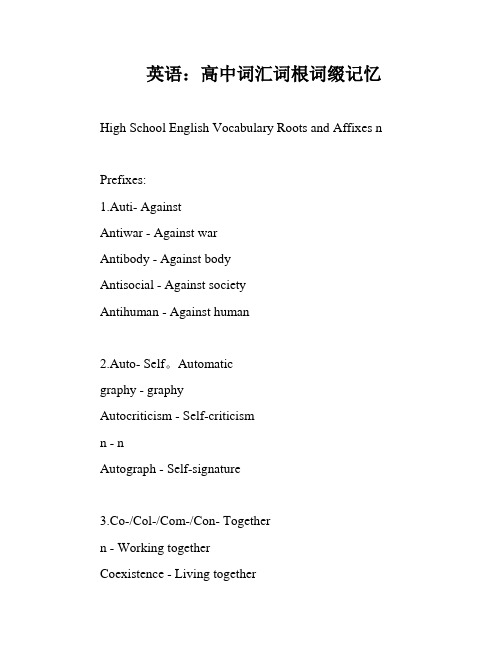
英语:高中词汇词根词缀记忆High School English Vocabulary Roots and Affixes nPrefixes:1.Auti- AgainstAntiwar - Against warAntibody - Against bodyAntisocial - Against societyAntihuman - Against human2.Auto- Self。
Automaticgraphy - graphyAutocriticism - Self-criticismn - nAutograph - Self-signature3.Co-/Col-/Com-/Con- Togethern - Working togetherCoexistence - Living togethern - Living togetherCollect - Gather togetherColleague - Work together Communicate - Share together Communism - Sharing together Company - panyn - panyCompass - Together nCombine - Join togetherCompress - Press togetherCommon sense - Shared understanding Compare - Examine together Consider - Think togetherContest - Compete together Conclude - Close togetherConstruct - Build togetherConflict - Clash togetherContain - Hold togetherConcentric - Together center Contemporary - Together timeConjoin - Join together4.Ad-/Ac-/Ap-/。
英语词根词缀讲解
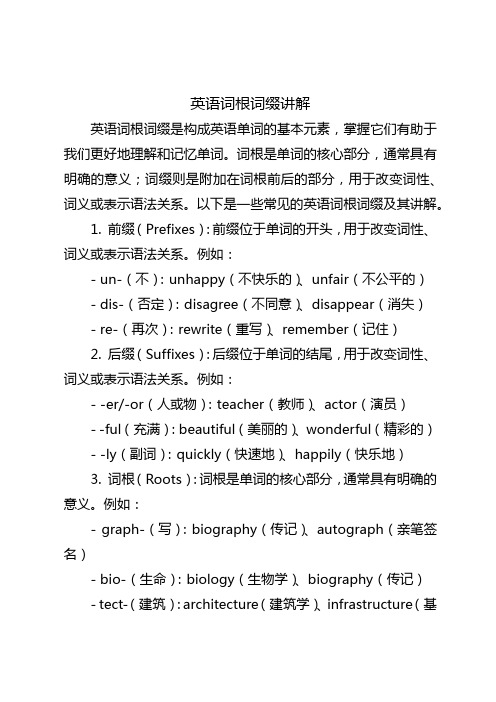
英语词根词缀讲解英语词根词缀是构成英语单词的基本元素,掌握它们有助于我们更好地理解和记忆单词。
词根是单词的核心部分,通常具有明确的意义;词缀则是附加在词根前后的部分,用于改变词性、词义或表示语法关系。
以下是一些常见的英语词根词缀及其讲解。
1. 前缀(Prefixes):前缀位于单词的开头,用于改变词性、词义或表示语法关系。
例如:- un-(不):unhappy(不快乐的)、unfair(不公平的)- dis-(否定):disagree(不同意)、disappear(消失)- re-(再次):rewrite(重写)、remember(记住)2. 后缀(Suffixes):后缀位于单词的结尾,用于改变词性、词义或表示语法关系。
例如:- -er/-or(人或物):teacher(教师)、actor(演员)- -ful(充满):beautiful(美丽的)、wonderful(精彩的)- -ly(副词):quickly(快速地)、happily(快乐地)3. 词根(Roots):词根是单词的核心部分,通常具有明确的意义。
例如:- graph-(写):biography(传记)、autograph(亲笔签名)- bio-(生命):biology(生物学)、biography(传记)- tect-(建筑):architecture(建筑学)、infrastructure(基础设施)4. 组合词根(Compound Roots):由两个或多个词根组成的词根。
例如:- tele-(远程):telephone(电话)、television(电视)- auto-(自动):automobile(汽车)、automatic(自动的)5. 转化词根(Fused Roots):由两个词根融合而成的词根。
例如:- pneumo-(空气):pneumonia(肺炎)、pneumatic(气动的)- psycho-(心灵):psychology(心理学)、psychiatry(精神病学)6. 派生词缀(Derivational Affixes):用于派生出新词的词缀。
stems and affixes(常见词根、前后缀)
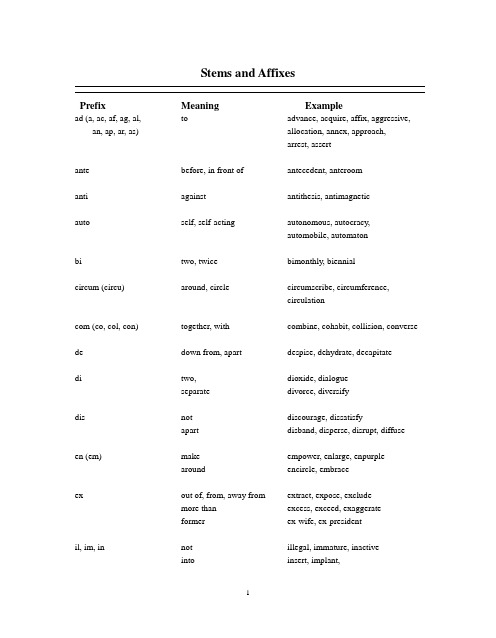
Stems and AffixesPrefix Meaning Examplead (a, ac, af, ag, al, to advance, acquire, affix, aggressive, an, ap, ar, as) allocation, annex, approach,arrest, assertante before, in front of antecedent, anteroomanti against antithesis, antimagneticauto self, self-acting autonomous, autocracy,automobile, automatonbi two, twice bimonthly, biennialcircum (circu) around, circle circumscribe, circumference,circulationcom (co, col, con) together, with combine, cohabit, collision, converse de down from, apart despise, dehydrate, decapitatedi two, dioxide, dialogueseparate divorce, diversifydis not discourage, dissatisfyapart disband, disperse, disrupt, diffuseen (em) make empower, enlarge, enpurplearound encircle, embraceex out of, from, away from extract, expose, excludemore than excess, exceed, exaggerateformer ex-wife, ex-presidentil, im, in not illegal, immature, inactiveinto insert, implant,inter, intro, intra, intel between, inside, within, interrupt, interpose,inward, into introvert, introspectintramural, intracellular,intracity, intelligible,intellectkilo thousand kilometer, kilogrammal bad, badly malfunction, maladaptation,malaria, malapplymacro great macrocosm, macrostructure micro small, tiny microcosm, microstructuremis wrong(ly) misbehave, mismanagebad misfortune, mischancemono one, single, alone monocracy, monotonous,multi many, much multilateral, multipurposemultiply, multilingualnon not, without nonstop, nonsticking, nonattackingob (有变体) against, not clear, object, opaque, offend,opposite obtriangular, obpyramidalover more than overestimate, overchargeper through pervious, pervadeperennial, perforatepre before prearranged, previouspro forward prospect, projector, progressfor, in favor of pro-slavery,popul, publ people population, populace, popularity,public, publicize, publishre back , again reload, retrace, return, response semi half, partly semicircle, semifinalretro back, backward retrospect,stereo solid, three dimensional stereophone, stereoanalysisstereochemistrysub(suf, sug, sup, sus, sur) under, below, lower submerge, subtitle, subeditorsuffer, suggest, surroundingsuspend,syl, sym, syn together, the same syllabus, syllogism, symphonysymmetry, synthetic, synchronizetele far away telescope, telecast, telelectureteleconversationtrans across transport, transfer, transparentbeyond transonic, transnormalultra excessive, extreme ultramodern, ultravioletup upward, in an upward upright, upstreamdirection upheaval, upgradeun not unqualified, unloadunder below, beneath, under undergo, underestimate, undertakeundermineuni one universe, unify, unilateral, uniformNoun suffix Meaning Exampleship 关系, 状态, 身份relationship, kingship,资格, 技巧, 技能apprenticeship, horsemanship总人数penmanship, membership, readershiphood 状态, 性质, 集体, falsehood, bachelorhood,时期orphanhood, maidenhood,neighborhoodfold time(s) manifold, millionfoldage state advantage, heritageplace village, anchorage,amount mileage, carriage, postage, portageian one who magician, physicianant one who assistant, inhabitantee one who trainee, intervieweeiot one who patriot, compatriot,aut one who astronaut, aquanauter, ar, or, one who writer, navigator,ist one who pianist, economist,tude state of latitude, altitude, attitude, longitude (t)ure state of mixture, departureal state of renewal, withdrawalance, ence state of importance, interference,cy, ency state of infancy, tendencyness state of carefulness, consciousnesstion, sion state of solution, reduction, permission, ment state of rearmament, equipment,ty, ity state of density, purity, moralityology study of theology, psychologyism doctrine of egoism, socialismVerb Suffix Meaning Exampleate make or cause to happen create, evacuateen make or cause to happen shorten, heightenify make or cause to happen glorify, certify, rectify, notify, ize make or cause to happen modernize, publicize, polularizeAdjective Suffix Meaning Exampleable, ible capable of edible, convertible, unreadableful full of beautiful, gracefulhandful, cupful, armfulless without hopeless, limitlessal having the nature of cultural, economicalant, ent having the nature of pleasant, dependent,ish having the nature of foolish, childishive having the nature of expensive, responsive, indicative ly having the nature of lovely, livelyed, ing having the nature of excited, interestingous, having the nature of glorious, prosperousy having the nature of tasty, windy, dusty, dirty Adverb Suffix Meaning Examplely in a certain manner slowly, happilyward in the direction of westward, homewardwise in the direction of clockwise, counterclockwise Roots Meaning Exampleann, enn year anniversary, annual, perennial aqua water aquarium, aquatel, aqueduct arch chief patriarch, matriarchmonarchy, anarchyastro space astronaut, astrophysics, astrometry aud(i) listen, hear audiometer, auditor, auditoriumauto self autograph, automation,car autocide, autoworkeravia bird, fly avian, aviator, aviarybibli book bibliography, Biblebio life autobiography, bio-weapon,cand light candle, incandescent, candid,cap(it) head captain, decapitate, capsizecast throw broadcast, telecastcent hundred century, centigrade, centimeter chron time synchronize, chronologicaldec ten decade, Decemberdem people democracy, epidemicdict, say dictation, predictdon give donate, pardon, doneeduct, duce lead, direct conduct, reduce, deduct, aqueduct ego sels egoist, egocentric, egomaniacfer take, carry transfer, confer, defer, circumferencerefer, preferflect, flex bend reflect, inflect, circumflex, flexiblegene begin genesis, autogenous, degenerateregenerategeo the earth geography, geometrygrad, gres step gradually, degradationregress, aggressivegram, graph write telegram, diagram,stereograph, autographhomo same homonym, homosexual, homogenoushydr water hydroscope, hydroaeroplanelog study theology, biologyword logic, dialogue, cataloguelumin light illuminate, lustremagna, magni great, big, large magnitude, magnate,magnanimous, magnifierman, mana, hand manacle, manuscriptmanu, main, manipulate, maintainmatri mother matrimony, matriarch, matrifocal metr, meter measure thermometer, astrometry, barometer mit, miss send permit, transmit, submissionopt eye, light optical, optics, optophone,optometristpat, pathy disease pathos, pathology,feeling telepathy, theopathetic, apathypatri father compatriot, patriarchpel, pul drive compel, compulsory, expel,dispel, repel, propellorpend hang pending, suspension,appendix, pendulumpay spend, expensivephon sound stereophonic, microphonepoly many polyester,port carry transport, import, exportpose place depose, opposition, compose,interposepsych soul or mind psychopath, psychologyrot turn, wheel rotate, circumrotaterupt break, burst disrupt, corrupt, interrupe scribe, scrip write transcribe, transcript, circumscribe scope see microscope, telescopesect cut dissect, vivisection, transect, sector sens, sent feel, think consent, resent, dissentspect, spise see inspect, circumspect, despisespir(e) breathe inspire, expire, conspiretain, tin hold retain, maintain, attain, continue the god theology, theocracy, monotheismthermo heat thermometer, thermostat,thermochemistrytribut give contribute, tributary, attributevac empty evacuate, vacation,vacuous, vacuumvert, vers, change converse, revert, diversifyvis, vise, vision see supervise, television,vig, vit, viv life vigorous, revitalize, revive, vivify vol, vor turn involve, volume, vortex, divorce,。
词根,词缀 roots and affixes
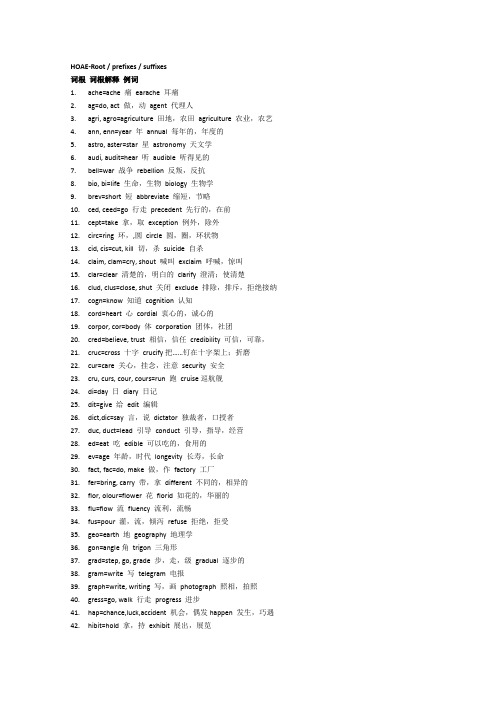
HOAE-Root / prefixes / suffixes词根词根解释例词1.ache=ache 痛earache 耳痛2.ag=do, act 做,动agent 代理人3.agri, agro=agriculture 田地,农田agriculture 农业,农艺4.ann, enn=year 年annual 每年的,年度的5.astro, aster=star 星astronomy 天文学6.audi, audit=hear 听audible 听得见的7.bell=war 战争rebellion 反叛,反抗8.bio, bi=life 生命,生物biology 生物学9.brev=short 短abbreviate 缩短,节略10.ced, ceed=go 行走precedent 先行的,在前11.cept=take 拿,取exception 例外,除外12.circ=ring 环,,圆circle 圆,圈,环状物13.cid, cis=cut, kill 切,杀suicide 自杀14.claim, clam=cry, shout 喊叫exclaim 呼喊,惊叫15.clar=clear 清楚的,明白的clarify 澄清;使清楚16.clud, clus=close, shut 关闭exclude 排除,排斥,拒绝接纳17.cogn=know 知道cognition 认知18.cord=heart 心cordial 衷心的,诚心的19.corpor, cor=body 体corporation 团体,社团20.cred=believe, trust 相信,信任credibility 可信,可靠,21.cruc=cross 十字crucify把……钉在十字桇上;折磨22.cur=care 关心,挂念,注意security 安全23.cru, curs, cour, cours=run 跑cruise巡航舰24.di=day 日diary 日记25.dit=give 给edit 编辑26.dict,dic=say 言,说dictator 独裁者,口授者27.duc, duct=lead 引导conduct 引导,指导,经营28.ed=eat 吃edible 可以吃的,食用的29.ev=age 年龄,时代longevity 长寿,长命30.fact, fac=do, make 做,作factory 工厂31.fer=bring, carry 带,拿different 不同的,相异的32.flor, olour=flower 花florid 如花的,华丽的33.flu=flow 流fluency 流利,流畅34.fus=pour 灌,流,倾泻refuse 拒绝,拒受35.geo=earth 地geography 地理学36.gon=angle角trigon 三角形37.grad=step, go, grade 步,走,级gradual 逐步的38.gram=write 写telegram 电报39.graph=write, writing 写,画photograph 照相,拍照40.gress=go, walk 行走progress 进步41.hap=chance,luck,accident 机会,偶发happen 发生,巧遇42.hibit=hold 拿,持exhibit 展出,展览43.hospit, hosp=guest 客人hospitable 好客的44.idio=particular, own, private, proper 特殊的,个人的,专有的idiom 惯用语,方言45.insul=island 岛insular 岛的,偏狭的46.it=go 行走exit 出口,退出47.ject=throw 投掷projection 投掷,发射48.lect, leg, lig=choose, gather 选,收elect 选举49.lev=raise 举、升elevate 抬起,使升高50.liber=liberty 自由liberation 解放51.lingu=language 语言linguist 语言专家52.liter=letter 文字,字母literate 识字的,有文化的53.loc=place 地方local 当地的54.log=speak 言,说dialogue 对话55.loqu=speak 言说eloquent 有口才的,雄辩的56.lun=moon 月亮lunar 月亮的,似月的57.manu, man=hand 手manuscript 手稿58.mar=sea 海marine 海上的,航海的59.medi=middle 中间mediate 居中调解,调停60.memor=memory,mindful 记忆,记住的memory 记忆,记忆力it=soldier 兵military 军事的,军队的62.mini=small,less 小minimum 最小数63.mir=wonder 惊奇,惊异admire 赞赏,钦佩64.mort=death 死mortal 终有一死的65.mot=move 移动motion 运动,动66.nomin=name 名nominal 名义上的,有名无实的67.nov=new 新novel 新的,新奇的68.numer=number 数numeral 数字,[语]数词69.oper=work 工作operation 手术,工作,操作70.ori=rise 升起orient 东方,东方的71.paci=peace 和平pacify 使和平,抚慰72.past=feed 喂,食pasture 放牧、牧场,吃草73.pel=push, drive 推,逐,驱propel 推动74.pend, pens=hang 悬挂pendent 悬空的,悬而未决的75.pet=seek 追求compete 竞争,比赛(pet:走impetus 推动,促进)76.phon=sound 声音phone 电话77.plen=full 满,全plenty 大量,丰富78.pone=put 放置postpone 推后,推迟79.popul=people 人民population 人口,全体居民80.port=carry 拿,带,运import 输入,进口81.pos=put 放置expose 揭露,揭发82.preci=price 价值precious 宝贵的,珍贵的83.pur=pure 清,纯purify 使纯净84.rect=right, straight 正,直correct 改正,纠正85.rupt=break 破rupture 破裂,使裂开86.sal=salt 盐salary 薪水87.sci=know 知science 科学88.sec, sequ=follow 跟随sequence 继续,连续89.sect=cut 切割section 切开,一部分90.sent, sens=feel 感觉sentiment 感情,思想感情91.son=sound 声音sonic 声音的,音速的92.spect=look 看spectate 出席,观看93.spir=breathe 呼吸inspire 鼓舞,吸入94.tail=cut 切,割tailor 裁缝,成衣商95.tain, ten=hold 握,持,守contain 容纳,包含,内装96.tect=cover 掩盖detect 侦查,发觉97.tempor=time 时temporary 暂时的,临时的98.tend, tens=draw 拉tension 拉紧,引力99.tent, tract=draw 拉,抽,引tractor 拖拉机100.urb=city 城市suburb 郊区,近郊101.ut=use 用utility 效用, 有用102.vac, vacu=empty 空vacancy 空白,空虚103.vad, vas=walk, go 行走invasion 入侵,侵略104.vari=change 变化variable 可变的,反复的105.ven=come 来convene 召集(会议),集会106.vert, vers=turn 转subvert 推翻,颠覆107.vi, via=way 路via 取道,经由108.vis, vid=see 看visible 可见的,看得见的109.vit=life 生命vital 充满活力的110.viv=live 活vivid 活泼的,有生气的前缀有如下几类:第一类:表示正负(或增减)的,如:un-in-im-il-ir-non-mis-mal-dis-anti-de-under-re-over-等;第二类表示尺寸的,如:semi-equi-mini-micro-macro-mega-等;第三类表示位置关系,如:inter-super-trans-ex-extra-sub-infra-peri-等;第四类表示时间和次序,如:ante-pre-prime-post-retro-等;第五类表示数字,如:semi-mono-bi-tri-quad-penta-hex-sept(em)-oct-dec-multi-等;其它类别,如:pro-auto-co-con-等表示否定的前缀1.dis-加在名词、形容词,动词之前。
affixes英语前后缀总结
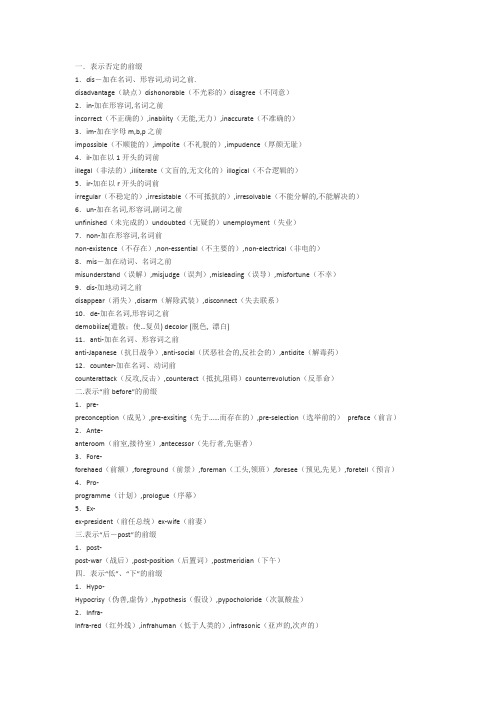
一.表示否定的前缀1.dis-加在名词、形容词,动词之前.disadvantage(缺点)dishonorable(不光彩的)disagree(不同意)2.in-加在形容词,名词之前incorrect(不正确的),inability(无能,无力),inaccurate(不准确的)3.im-加在字母m,b,p之前impossible(不顺能的),impolite(不礼貌的),impudence(厚颜无耻)4.il-加在以1开头的词前illegal(非法的),illiterate(文盲的,无文化的)illogical(不合逻辑的)5.ir-加在以r开头的词前irregular(不稳定的),irresistable(不可抵抗的),irresolvable(不能分解的,不能解决的)6.un-加在名词,形容词,副词之前unfinished(未完成的)undoubted(无疑的)unemployment(失业)7.non-加在形容词,名词前non-existence(不存在),non-essential(不主要的),non-electrical(非电的)8.mis-加在动词、名词之前misunderstand(误解),misjudge(误判),misleading(误导),misfortune(不幸)9.dis-加地动词之前disappear(消失),disarm(解除武装),disconnect(失去联系)10.de-加在名词,形容词之前demobilize(遣散;使…复员) decolor (脱色, 漂白)11.anti-加在名词、形容词之前anti-Japanese(抗日战争),anti-social(厌恶社会的,反社会的),antidite(解毒药)12.counter-加在名词、动词前counterattack(反攻,反击),counteract(抵抗,阻碍)counterrevolution(反革命)二.表示“前before”的前缀1.pre-preconception(成见),pre-exsiting(先于……而存在的),pre-selection(选举前的)preface(前言)2.Ante-anteroom(前室,接待室),antecessor(先行者,先驱者)3.Fore-forehaed(前额),foreground(前景),foreman(工头,领班),foresee(预见,先见),foretell(预言)4.Pro-programme(计划),prologue(序幕)5.Ex-ex-president(前任总统)ex-wife(前妻)三.表示“后-post”的前缀1.post-post-war(战后),post-position(后置词),postmeridian(下午)四.表示“低”、“下”的前缀1.Hypo-Hypocrisy(伪善,虚伪),hypothesis(假设),pypocholoride(次氯酸盐)2.Infra-Infra-red(红外线),infrahuman(低于人类的),infrasonic(亚声的,次声的)3.Sub-Sub-editou(副编辑),sub-way(地铁),sub-conscious(下意识的),submarine(海下的),subtropical(亚热带的),subtitle(副标题)五.表示“回”、“再次”、“向后”的前缀1.Re-Refuel(给…加油),retranslate(再译),reinforce(加强),reconstruct(重建),return(返回)2.Retro-Retrograde(倒退的),retrospect(回顾)六.表示“共同”、“和”的前缀1.Co-co-exist(共存),co-operate(合作),co-education(男女同校)七.表示“相互”、“之间”的前缀1.Inter-Interchangeble(可互换的),interdipendert(互相依靠的),international(国际的),inter-national(交往)八. 表示“出”、“超出”的前缀1.Ec-Eclipse(蚀),ecstasy(狂想)2.Extra-Extraordinary(非凡的),extramural(校外的),extrasensory(超感觉的)九.表示“超过”的前缀1.hyper-, preter-, super-, sur-, ultra-hyper-sensitive(过敏的),preterhuman(超人的)十.其它的前缀1.auto-自automatic(自动的),auto-autobilgraphy(自传)2.mal-坏,恶Malnutrition(营养不良),maltreat(虐待)3.Micro-Microscope(显微镜),microtome(切片机)4.Tele-远Telegram(电报),telephone(电话),telescope(望远镜)5.Demi-,semi-hemi-Semi-circle(半圆),hemisphere(半球),demilune(半月,新月)6.Uni-, mono-(单一, 单独)Monotone(单调),monologue(独白),uniform(制服)7.Bi-,di-二Biyearly(二年一次的),biweekly(二周一次的),dichloride(二氯化物)8.Tri-三Triangle(三角),tripld(三角架)9.Multi-多multi-colored(颜色多样的),multi-national(多国的)10.Poly –多Polygon(多角形),polytomic(多原子的)11.Arch-首领archbishop(大主教),architect(建筑师)12.bene-善,好benefit(利益),benevolence(善意)13.homo-同homosexual(同性恋的),homograph(同形异义字)14.neo新neo-colonialism(新殖民主义),neolithic(新石器时代的)15.ortho-正确,直orthogonal(直角的),orthodox(正统)16.philo-挚爱philosopher(哲学家)17.proto-原始protohydrogen(初氢),prototype(原型),protoplasm(原生质)18.pseudo-假的, 伪的, 冒充的pseudonym(匿名),pseudo-communism(假共产主义)19.a-,ab-,abs-(只有在t,c之前)从,自avoid(避免),absent(缺少的),abstain(抑制),abstract(吸引)20.Apo-,aph-来自apology(道歉,谢罪),apostle(倡言者,先驱)21.se-分离separation(分开),secure(安全的),sedition(煽动叛乱)22.para-防parachute(降落伞),23.omni-所有的,公共的omnibus(公共汽车),omnipotence(万能)24.pan-全,泛Pan-American(全美的),pancean(万灵药),panorama(风景的全貌;万花筒)25.panto-全pantisocracy(乌托邦大同世界),pantoscopic(视野广大)26.dia-通过,借以diagonal(对角的),diagnosis(诊断),dialogue(对话)27.Per-通过,彻底,不利perambrlate(走来走去),perfect极好的28.trans-通过,横过transcript(抄本, 副本; 记录),translation(翻译),trxnsparent(透明的),transport(运输),trans-plant(移植)29.Com-,con-,cor-,col-共同,和,完全comment(评论),compile(编辑),correlation(相互关系),collect(收集),corruption(贪污腐败),collaborate (合作,合著)30.syn-共同synonym(同义词),synchronization(同步),syntonic(谐振的),synthetic(人工的,合成的)31.meta-和,在……之后metaphor(比喻),metaphysics(形而上学)32.Cis-在这一边cisatlantic(大西洋这边的)33.pen-几乎,相近peninsular(.住在半岛上的居民,半岛(状)的, 形成半岛的)34.en-,em-往……里,使……encamp(扎营),enable(使……能),endear(使……受喜爱),embrace(拥抱,抓住(机会))35.intro内在intracardiac(心脏内部的),intramolecular(分子内部的),intracelular(细胞内部的)36.intro-到……中introduce(介绍),introspect(反省,内省)37.dys-坏dyspepsia(消化不良),dysentry(痢疾)38.Eu-优,美好eulogy(颂词),euphony(悦耳的声音)39.ambi-,amphi-两者amphibian(两栖的),ambidextrous(两只手都很灵巧的;心怀二意的;非常灵巧的)40.penta-五pentagon(五角大楼),pentagram(五角星),pentameter(五步诗句)41.sex-六sexangle(六角),sexennial(六年一度的)42.sept-七September九月(古罗马的七月),septennial(七年一度)43.hepta-七heptab(七个成套之物),heptagon(七角形)44.octa-,octo,oct八octagon(八角形),octuple(八倍)October (十月)45.nona-,ennea-九nonagon(九角形),ennead(九个一组)46.deci-,deca-十decimal(十进位的),decagramme(十克)47.centi-百centimeter(厘米),centipede(蜈蚣)48.milli-千millenias(千年的),millimeter(毫米)49.Kilo-千kilowatt(千瓦),kilometer(千米)后缀1.-ster,-eer,-er(or)意为:从事某种职业或参与某种活动的人(person engaged in an occupation or activity)例词:gamester,gangster,songster,engineer,profiteer,mountaineer,auctioneer,driver,teacher,director,actor,professor 2.-let意为:小或者不重要的东西(small,unimportant things)例词:booklet,leaflet,starlet3.-ette意为:1)小的东西(small)例词:cigarette 2)假的东西(imitation)例词:leatherette 3)女性(female)例词:usherette4.-ess意为:女性(female)例词:actress,poetess,hostess,paintress5.-hood意为:时期(status;etc.)例词:boyhood,childhood,manhood6.-ship意为:才能,状态,资格,品质等(skill,state,condition,status,quality)例词:leadership,friendship,membership,lectureship,sportsmanship7.-ful意为:量(the amount which noun contains)例词:cupful,handful, mouthful,spoonful8.-tion,-ion意为:1)状态,行动等(state;action;etc.)例词:action,oppression,possession,education,starva- tion 2)机构等(institution;etc.)例词:organization,foundation9.-ment意为:状态,行动等(state;action;etc.)例词:movement,enslavement,pavement10.-al意为:动作(action)例词:arrival,refusal,revival,recital,removal11.-age意为:程度,数量等(extent;amount;etc.)例词:wastage,coverage, acreage,shrinkage,breakage,hostage 12.-ness;-ity(ty)意为:状态,品质(state;quality;etc.)例词:happiness, usefulness,selfishness,kindness,rapidity,activity,sanity,changeability13.-ism意为:道义,主义,学说等(doctrine of,practice of)例词:idealism, impressionism,absenteeism,racism 二、动词后缀常见的此类后缀及其具体含义如下:1.-ify意为:转为,变为(to turn into,to make or become)例词:beautify, diversify,simplify2.-ize;-en意为:使……,变得……(to make or become ;to make into)例词:modernize,popularize,legalize,hospitalize,symbolize,ripen,widen,heighten,threaten3.-ate意为:增加,使……(give or add,make or become)例词:originate, hydrogenate,validate,differentiate 三、形容词后缀:常见的此类后缀及其具体含义如下:1.-ful意为:充满,有(full of;hav- ing;giving;etc.)例词:useful,pitiful, hopeful,helpful,forgetful,thankful, fearful2.-less意为:没有,无(without;not giving)例词:speechless,childless,harmless,hopeless,meaningless 3.-ly意为:有……品质的(having the qualities of)例词:beastly,manly, brotherly,friendly4.-like意为:像……的(like)例词:childlike,statesmanlike,tiger-like5.-y;-ish意为:像……一般的(somewhat like)例词:meaty,sandy, silky,hairy,leafy,watery,foolish,girlish,blackish,thinnish6.-some意为:像……一样的;引起……的;有……品质的(like;causing;having the quality of)例词:troublesome,burdensome,wholesome,tiresome,bothersome7.-able(ible)意为:能……的;可以……的(able to be ;capable)例词:changeable,readable,drinkable,comfortable,expansible,convincible8.-ed意为:有……的(having,etc.)例词:wooded,pointed,moneyed, odd-shaped9.-al意为:有……属性的,……类型的(nature of,typical of)例词:cultural,personal,regional,musical10.-ary(ory)意为:属于……的,与……相连的(belonging to;connected with)例词:revolutionary,imaginary, contradictory11.-ous意为:富含……的;有……品质的;像……的(full of;having the quality of;like)例词:glorious,erroneous,malicious,gracious12.-ic(ical)意为:……类的;属于……的(typical of;belonging to)例词:historic,historical,methodic,methodical,dramatic,heroic13.-ive意为:有……属性的;有某种倾向的(having the nature or quality of;given or tending to)例词:attractive, talkative,restrictive,defensive,preventive,constructive,sensitive四、副词后缀常见的此类后缀及其具体含义如下:1.-ly意为:以……方式(in a...manner;etc.)例词:happily, boldly,attentive- ly,strangely2.-ward(s)意为:表示方式或动作的方向(manner and direction of movement)例词:onward(s),backward (s),earthward(s),homeward(s),eastward(s)3.-wise意为:1)按照……方式(in the manner of)例词:crabwise,clockwise2)就……而言(asfar as ...is concerned)例词:weatherwise ,educationwise有一个原因的单音节词,结尾只有一个单音辅音,在加以元音后缀是,要双写这个辅音.例词:run + er = runner hit + ing = hitting。
英语语言学概论 Chapter 5 Morphology(形态学)

{z}: /s/: after voiceless consonants except /s/, / /, and / /, books, maps streets; /z/ after vowels and voiced consonants except /z/, / /, / /.bags, cars keys /iz/ after /s/, /z/, / /, / /, / /, / /. sizes, bridges bosses, matches
Semantically:root(词根 and affix 词根) 词根 affix( 词缀): prefix(前缀 suffix(后缀 ; 前缀), 后缀) 词缀 前缀 后缀 derivational affixes(派生词缀 and 派生词缀) 派生词缀 inflectional affixes(屈折词缀 屈折词缀) 屈折词缀 Structurally: free morphemes(自由词素 自由词素, 自由词素 即自由词根) and bound morphemes(粘 即自由词根 粘 着词素) 着词素
Affixes(词缀 those that lexically 词缀): 词缀 depend on roots and do not convey the fundamental meaning of words. Interralation: all free morphemes(like bird) are roots but not all roots are free morphemes. (like spect). All affixes are bound morphemes but not all bound morphemes are affixes (like ceive)
female词根词缀
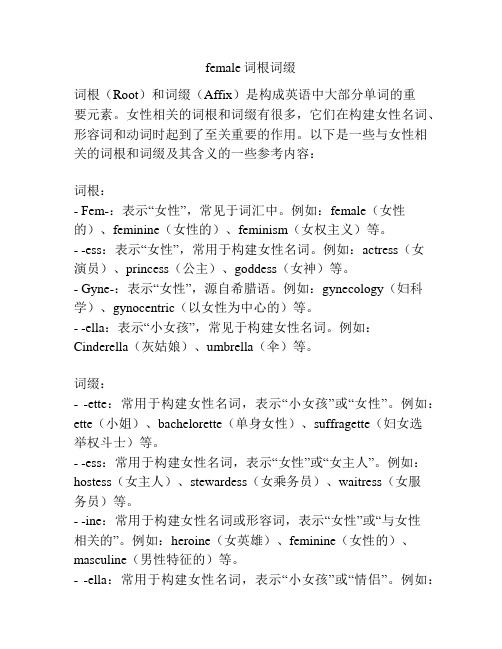
female词根词缀词根(Root)和词缀(Affix)是构成英语中大部分单词的重要元素。
女性相关的词根和词缀有很多,它们在构建女性名词、形容词和动词时起到了至关重要的作用。
以下是一些与女性相关的词根和词缀及其含义的一些参考内容:词根:- Fem-:表示“女性”,常见于词汇中。
例如:female(女性的)、feminine(女性的)、feminism(女权主义)等。
- -ess:表示“女性”,常用于构建女性名词。
例如:actress(女演员)、princess(公主)、goddess(女神)等。
- Gyne-:表示“女性”,源自希腊语。
例如:gynecology(妇科学)、gynocentric(以女性为中心的)等。
- -ella:表示“小女孩”,常见于构建女性名词。
例如:Cinderella(灰姑娘)、umbrella(伞)等。
词缀:- -ette:常用于构建女性名词,表示“小女孩”或“女性”。
例如:ette(小姐)、bachelorette(单身女性)、suffragette(妇女选举权斗士)等。
- -ess:常用于构建女性名词,表示“女性”或“女主人”。
例如:hostess(女主人)、stewardess(女乘务员)、waitress(女服务员)等。
- -ine:常用于构建女性名词或形容词,表示“女性”或“与女性相关的”。
例如:heroine(女英雄)、feminine(女性的)、masculine(男性特征的)等。
- -ella:常用于构建女性名词,表示“小女孩”或“情侣”。
例如:bella(美女)、Cruella(克鲁埃拉,迪士尼动画《101斑点狗》中的角色)等。
除上述词根和词缀外,还有一些特定于某些单词领域的词根和词缀,例如医学领域中的-gyn-(表示“女性”)和-obstet-(表示“产科”),或法律领域中的-fem-或-femin-(表示“女性”)等。
这些词根和词缀在英语中有广泛的应用。
英汉后缀词比较

英汉后缀词比较一、词缀的定义词缀这一概念引自西方语言学,布龙菲尔德( Bloomfield ) 在《语言论》中这样给词缀下定义:“在次要派生结构中那些附加在基础形式上的粘附形式就是词缀(affixes)”。
一般说来,语素必须具备以下三个特点才能称之为词缀:1.词汇意义虚化,只表示某种抽象概括的语法类义。
2.位置固定,即总是在词首或词尾。
3.构词能力强。
虽然如此,学界对于词缀的确认仍有严式和宽式的不同。
“严式”根据词缀的三个特点来判定词缀属性,尤以“语义完全虚化”作为主要标准。
这种观点以朱德熙为代表,他认为:真正的词缀只能粘附在词根成分上头,它跟词根成分只有位置上的联系,没有意义上的关系。
吕先生还认为,有些语素差不多可以算是前缀或后缀,但因为它们在语义上还没有完全虚化,有时候还以词根的面貌出现,所以只可以称之为类前缀或类后缀。
这种比较宽容地确定词缀的意见属“宽式”。
二、英语后缀词英语和汉语的后缀主要特点相同,即都是附加在某实素词后构词的。
与前缀不同,英语的后缀主要是改变原词干的词性,在意义上只是对原义加以修饰而已。
根据后缀改变词性这一特征,可把后缀归纳成四大类(Quirketa1.1985:1539—1557):(1)名词后缀(构成的词全部为名词)加在名词后表“人”或“物”:一eer、一er、ess、一ette、一let、一ster加在动词后表“人”或“物”:一ant、一ee、一ent、一er;加在名词后表“人、民族”或“语言、信仰”:一ese、一an、一ist、一ite;加在名词后表“性质、状态”:一age、一dom、一ery(一ry)、一ful、一hood、一ing、一ism、一ship加在动词后表“性质、状态”:一age、一al、一ance、一ation、一ence、一ing、一ment;加在形容词后表“性质、状态”:一ity、一ness;(2)形容词后缀加在名词后:一ed、一ful、一ish、一less、一like、ly、一Y、一al(一ial、一ical)、一es —que、一ic、一OUS(一eous、一ious、一UOUS);加在动词后:~able(一ible)、一ative(一ive、一sive);(3)副词后缀加在形容词后:一ly;加在名词或形容词后:~ward(一wards);加在名词后:~wise;(4)动词后缀(都加在名词和形容词后)一ate、一en、一ify、一ize(一ise)。
英语词汇记忆方法的发展历史
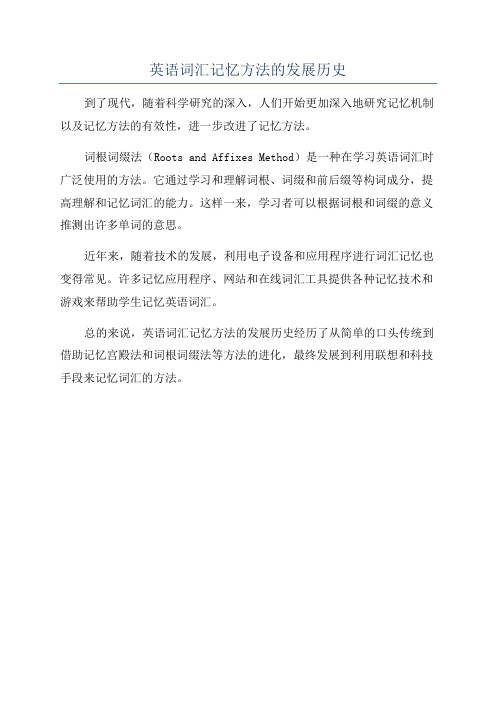
英语词汇记忆方法的发展历史
到了现代,随着科学研究的深入,人们开始更加深入地研究记忆机制以及记忆方法的有效性,进一步改进了记忆方法。
词根词缀法(Roots and Affixes Method)是一种在学习英语词汇时广泛使用的方法。
它通过学习和理解词根、词缀和前后缀等构词成分,提高理解和记忆词汇的能力。
这样一来,学习者可以根据词根和词缀的意义推测出许多单词的意思。
近年来,随着技术的发展,利用电子设备和应用程序进行词汇记忆也变得常见。
许多记忆应用程序、网站和在线词汇工具提供各种记忆技术和游戏来帮助学生记忆英语词汇。
总的来说,英语词汇记忆方法的发展历史经历了从简单的口头传统到借助记忆宫殿法和词根词缀法等方法的进化,最终发展到利用联想和科技手段来记忆词汇的方法。
语法标注解释 affix英音
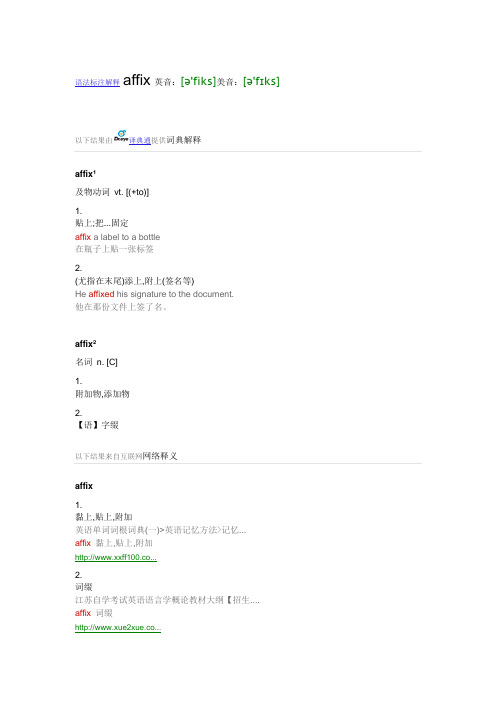
语法标注解释affix英音:[ə'fiks]美音:[ə'fɪks]以下结果由译典通提供词典解释
affix1
及物动词vt. [(+to)]
1.
贴上;把...固定
affix a label to a bottle
在瓶子上贴一张标签
2.
(尤指在末尾)添上,附上(签名等)
He affixed his signature to the document.
他在那份文件上签了名。
affix2
名词n. [C]
1.
附加物,添加物
2.
【语】字缀
以下结果来自互联网网络释义
affix
1.
黏上,贴上,附加
英语单词词根词典(一)>英语记忆方法>记忆...
affix黏上,贴上,附加
http://www.xxff100.co...
2.
词缀
江苏自学考试英语语言学概论教材大纲【招生....
affix词缀
http://www.xue2xue.co...
3.
附件[录],添加剂
暖通空调术语-科技词汇affix附件[录],添加剂http://www.xmelink.co...显示更多网络释义结果。
affix
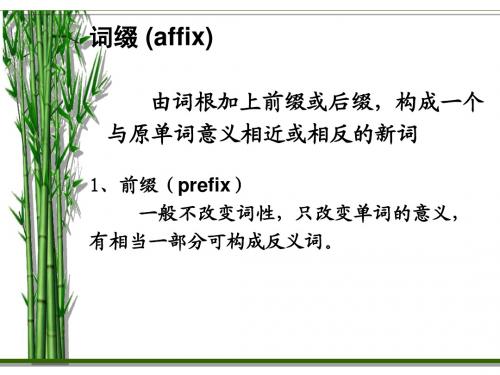
imimininunun-
⑵ 构成反义词:意为"错误地,反,不够" 构成反义词:意为"错误地, 不够"
take mistake mislead misunderstand antibody anti-Japanese underage underused
mismis-
lead understand
create collect relate thank forget grate
ive
creative collective relative thankful forgetful grateful
ful
② 名词加后缀构成形容词
beauty care person history danger import differ second noise sun class beautiful careful personal historic dangerous important different secondary noisy sunny classical
ing
y cloud cloudy
dark weak sharp friend love live lone week en
darken weaken sharpen friendly lovely lively lonely weekly
ly
(3) 构成副词的后缀
loud lucky usual loudly luckily usually
⑷ 表示其他意思 en和名词或形容词构成动词 endanger enlarge enjoy tell encourage retell rewrite review enable
屈折词缀的语法意义

屈折词缀(inflectional affixes)是一种形态学概念,用于描述添加到词根上的语素,用以表示词的语法属性而不改变词的基本含义。
屈折词缀可以对名词、动词、形容词和副词起到作用,从而指示时态、格局、数量、人称等语法意义。
以下是一些关于屈折词缀的例子:1. 英语动词的时态和语态:2. 过去式(Simple Past Tense):例如,通过添加“-ed”缀("talk" 变成 "talked")。
3. 进行时态(Present Continuous):通过添加"-ing"缀 (例如:"talk" 变成 "talking")。
4. 英语名词的数(Number):5. 复数形式:例如,通过添加“-s”缀("cat" 变成 "cats"),或者通过添加"-es"缀("box" 变成 "boxes")。
6. 形容词的比较级 (Comparative Form) 和最高级 (Superlative Form):7. 比较级:通过添加“-er”缀("tall" 变成 "taller")。
8. 最高级:通过添加“-est”缀("tall" 变成 "tallest")。
需要注意的是,屈折词缀不改变词的基本含义。
例如,在 "talk"(谈话)到 "talked"(谈话过)的变化中,基本含义“谈话”不变;而 "talk" 变成 "speaker"(说话者)时,通过派生词缀改变了基本含义,属于派生词缀。
通过了解屈折词缀及其所承载的语法意义,我们可以更好地理解和运用不同语言的语法现象。
词的六种构成方式
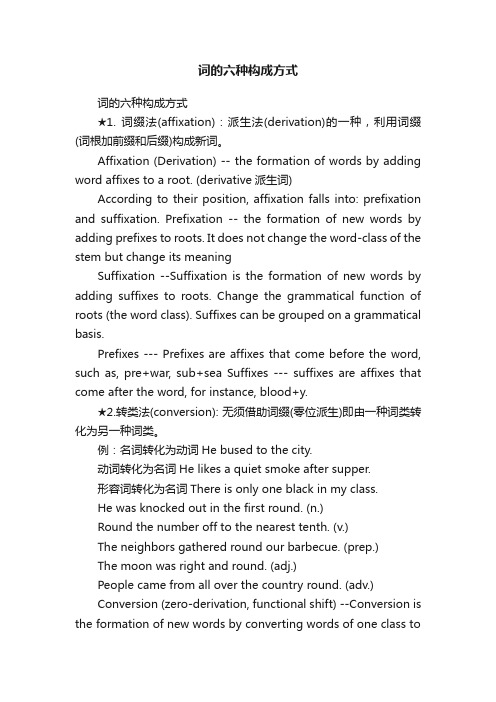
词的六种构成方式词的六种构成方式★1. 词缀法(affixation):派生法(derivation)的一种,利用词缀(词根加前缀和后缀)构成新词。
Affixation (Derivation) -- the formation of words by adding word affixes to a root. (derivative派生词)According to their position, affixation falls into: prefixation and suffixation. Prefixation -- the formation of new words by adding prefixes to roots. It does not change the word-class of the stem but change its meaningSuffixation --Suffixation is the formation of new words by adding suffixes to roots. Change the grammatical function of roots (the word class). Suffixes can be grouped on a grammatical basis.Prefixes --- Prefixes are affixes that come before the word, such as, pre+war, sub+sea Suffixes --- suffixes are affixes that come after the word, for instance, blood+y.★2.转类法(conversion): 无须借助词缀(零位派生)即由一种词类转化为另一种词类。
例:名词转化为动词He bused to the city.动词转化为名词He likes a quiet smoke after supper.形容词转化为名词There is only one black in my class.He was knocked out in the first round. (n.)Round the number off to the nearest tenth. (v.)The neighbors gathered round our barbecue. (prep.)The moon was right and round. (adj.)People came from all over the country round. (adv.)Conversion (zero-derivation, functional shift) --Conversion is the formation of new words by converting words of one class toanother class. These words are new only in a grammatical sense. The most productive is between nouns and verbs.A change of grammatical functionThe different range of meaning①Conversion to nouni. Verb to noun-almost all monomorphemic verbs can be used as nouns.have a look/ try/smoke, take a walk/ glance/shower,make a move/ guess/ offer/ attempt, give a cry/ start/ shudderflow over---overflow, break out---outbreak, take in---intake1) doer of the action: cheat( one who cheats), cook, coach, flirt, help2) result of the action: catch ( what is caught), find, reply, reject, import3) tool or instrument to do the action with: cover (used to cover something), wrap, cure4) place of the action: pass ( where one has to pass), walk ( a place for walking), dump, divide, turn, retreat, hide-out5) state of mind or sensation: doubt, want, desire, love, taste6) event or activity: search, laugh, attempt, release, shut-down, intake, outbreakii. Adjective to noun (full conversion, partial conversion)1. Words fully converted-a noun converted from an adjective has all the characteristics of nouns. It can take an identical article or –e(s).E.g. a white, a liberal, finals, a given, a drunknative--- two natives, the native’s language, young marrieds, newly-weds2. Words partially converted–do not possess all the qualitiesa noun does. They must be used together with definite articles. They retain some of the adjective features. Words of this class generally refer to a group of the kind.E.g. the poor, the rich, the sick, the wealthy, the wounded, the accused, the sublimethe comparatively rich, the very unfortunate, the most corrupt of them all3. Miscellaneous conversion: nouns from conjunctions, modals, finite verbs, prepositions,etcE.g. Would you like a with or a without? 要不要人陪你?Better to be an also-ran than a never-was. 宁做失败者,不当平庸人。
- 1、下载文档前请自行甄别文档内容的完整性,平台不提供额外的编辑、内容补充、找答案等附加服务。
- 2、"仅部分预览"的文档,不可在线预览部分如存在完整性等问题,可反馈申请退款(可完整预览的文档不适用该条件!)。
- 3、如文档侵犯您的权益,请联系客服反馈,我们会尽快为您处理(人工客服工作时间:9:00-18:30)。
ContentsAlphabetic Index (2)Index of letter A (2)Index of letter B (7)Index of letter C (8)Index of letter D (11)Index of letter E (13)Index of letter F (16)Index of letter G (17)Index of letter H (19)Index of letter I (21)Index of letters JK (24)Index of letter L (24)Index of letter M (26)Index of letter N (29)Index of letter O (30)Index of letter P (33)Index of letter Q (37)Index of letter R (38)Index of letter S (38)Index of letter T (42)Index of letter U (45)Index of letter V (46)Index of letter W (47)Index of letter X (48)Index of letter Y (48)Index of letter Z (48)Thematic Index (49)Thematic index of Biochemistry (49)Thematic index of Biological classes (49)Thematic index of Chemical elements (50)Thematic index of Chemical radicals (51)Thematic index of Colours (53)Thematic index of Culture & society (53)Thematic index of Diminutives (55)Thematic index of Direction & movement (55)Thematic index of Gender (56)Thematic index of Grammatical affixes (57)Thematic index of Human body (60)Thematic index of Knowledge (65)Thematic index of Language & writing (65)Thematic index of Living world (66)Thematic index of Medicine & surgery (69)Thematic index of Miscellaneous (72)Thematic index of Negatives (72)Thematic index of Numbers & multiples (72)Thematic index of Physical world (74)Thematic index of Places & peoples (76)Thematic index of Position (77)Thematic index of Proportions (78)Thematic index of Qualities (79)Thematic index of Religion & spirit (81)Thematic index of Sensations (81)Thematic index of Shapes (82)Thematic index of Substances (83)Thematic index of Technology (84)Thematic index of Time (85)Alphabetic IndexIndex of letter Aa-1Not or without.a-2Towards, of, in, into or at; marking some ongoingprocess or state; movement onwards or away.-a1Forming singular words of various types.-a2The plural of certain nouns of Latin or Greek origin.-a3Informal terms in spoken English.ab-Off, away, or from.abdomin(o)-The abdomen.-able Able to be.abs- See ab--ac Forming adjectives and nouns.ac- See ad--acal See -acacanth(o)-Spiny or thorny.acar(o)- A mite or tick.-acea Groups of animals.-aceae Families of seed-bearing plants.-acean See -acea-aceous Forming adjectives.acet(o)-Acetic acid or the acetyl group.acid(o)-Acid; sharp or sour.-acious Inclined to, given to, or having as a capacity.acoust(o)-Sound or hearing.acr(o)- A tip, height, or extremity.acryl(o)-Acrylic.actin(o)- A ray or beam.-acusis A condition of the hearing.-acy See -cyad-Motion or direction to; reduction or change into;addition, increase, or intensification.-ad1Collective numerals; nymphs.-ad2Indicating a direction towards some part of the body. -ade Denoting an action, its result, or something associatedwith it.aden(o)- A gland.adip(o)-Fat or fatty tissues.-ado Forming a variety of words based on Portuguese,Spanish, or Italian originals.adren(o)-The adrenal glands.-ae Forming plurals.-aemia A substance present in the blood, especially in excess. aer(o)-Air or another gas; the atmosphere; aircraft.af- See ad-afore-Before or previously.Afro-Africa; African and …ag- See ad--age Forming nouns.-agogue Leading or promoting.-agra Pain in some part of the body.agro-Farming; cultivation.-aholic A person excessively fond of something.-aire A person characterized by or linked to the idea in thestem.-akusis See -acusisal- See ad--al1Forming adjectives and some nouns.-al2An aldehyde.alb-White or bright.aldo-An aldehyde.-ales Orders of plants.-algia Pain, usually in a specified part of the body.algo-Pain.-alia A collection or group.-ality See -ityall(o)-Other; different.alumin(o)-Aluminium.-ama See -oramaambi-On both sides; around.amid(o)-The CONH2- group in chemical compounds. amino-The amine group, NH2—.amnio-The amnion.amph(i)-Variously two, both, on both sides, or around. amyl(o)-Starch.-an See -ianan- See a-1, ad-, and ana--ana Things associated with a person, place, or field ofinterest.an(a)-Variously up, back, or again.-ance A state or quality; a process or action.anchylo- See ankylo--and A person or thing to be treated in a specified way. andr(o)-Male or maleness.-androus Maleness.-ane1Saturated straight-chain (aliphatic) hydrocarbons. -ane2Forming adjectives.anem(o)-The wind.-aneous See -ousangi(o)-Blood or seed vessels.-angium A container.Anglo-English or British; English or British and …anis(o)-Unequal, asymmetrical, dissimilar.ankylo-Bent or crooked; stiff or fixed.-ant Forming adjectives and nouns.ante-Before or preceding.antero-Nearer the front of the body; forward in time.anth(o)- A flower or flowers.anthrac(o)-Coal or carbon; a carbuncle.anthrop(o)-Human, or of a human being.-anthropy Human, or humankind.ant(i)-Acting against, resisting, or opposing something; theopposite or reverse of something.ap- See ad-apic(o)- A point or apex.apo-Away from; separate from.après- A period following some activity.aqua-Water.ar- See ad--ar1Forming adjectives.-ar2Forming nouns.arachn(o)- A spider or spiders.-arama See -oramaarbor(i)- A tree or trees.-arch See -archyarch-Chief; principal; pre-eminent of its kind.archaeo-Ancient or prehistoric times.arche- See arch--archy Government; rule of a particular type; a chief or ruler. -ard Forming nouns.areo-The planet Mars.argent(o)-Silver.-arian Forming adjectives and corresponding nouns.-arious Connected with; pertaining to.-arium A place or container connected with, or employed for,some purpose.-aroo See -erooarsen(o)-Arsenic.-art See -ardarteri(o)-An artery.arthr(o)- A joint.-ary1Forming nouns.-ary2Forming adjectives.as- See ad-asc(o)- A bag or sac.-ase An enzyme.-asis A disease or other medical condition.-ast A person connected with a pursuit or activity.-aster Inferior; a poor imitation.astr(o)- A star or other celestial body; outer space; star-shaped. at- See ad--ata See -a2-atable See -ate3-ate1Forming nouns.-ate2Forming adjectives.-ate3Forming verbs.-ateria See -teriaather(o)-An atheroma.-athon An event long in duration, usually for fund-raisingpurposes.-ati Groups of people.-atic Forming adjectives, and some nouns.-atile Possibility, potential, or ability.-ation An action, or an instance of an action.-ative Characteristic or predisposed.-ator See -or1-atory See -ory1 and -ory2atto-In units of measurement, a factor of 10-18.audi(o)-Hearing or sound.aur(i)-Gold.Austro-1Austria; Austria and …Austr(o)-2Australia; Australia and …; southern. aut(o)-1Self; oneself; by itself.auto-2An automobile or motor vehicle.aux(o)-Growth or increase.avi- A bird or birds; flight.axo-An axis.az(o)-Nitrogen; the chemical radical -N=N-. -azole See -ole1Index of letter Bbacill- A bacillus.-bacter A genus of bacteria.bacteri(o)-Bacteria.baro-Pressure.basi- A base or basis.basidio- A basidium.bathy-Depth.be-Forming verbs and adjectives.bene-Good; well.benz(o)-Benzene.bi-Two; having two; doubly.biblio- A book or books.bili-Bile.-bility See -ablebin- See bi-bio-Life; living things.-biosis A mode of life.bis- See bi--blast An immature or embryonic cell. blasto-Germination.-ble See -ableblephar(o)-The eyelid.bor(o)-Boron.-bot Automatic or autonomous device or software program. botry(o)- A bunch of grapes.brachi(o)-An arm.brachy-Shortness.brady-Slowness.branchio-Gills.Brit-British.brom(o)-Bromine.bronch(o)-The bronchi.bryo-Moss.bucco-The cheek.but-Four-carbon chains of atoms.by-Subordinate; incidental; secondary.Index of letter Ccac(o)-Unpleasant, bad, or incorrect.-cade A procession or show.calc(i)-Lime or calcium.calli-Beautiful.carb(o)-Carbon.carboxy-The carboxyl group.carcino-Cancer.-cardial See -cardiumcardi(o)-The heart.-cardium Tissue related to the heart.-carp A fruit or fruiting body.caryo- See karyo-cat(a)-Movement downwards; figuratively, wrong or inferior. -cele A tumour, swelling, or hernia.celo- See coelo--cene A division of geological time.-centesis A puncture or perforation of a body cavity.centi-One hundredth; a multiple of a hundred.centr(i)- A centre.-centric Having a specified centre.centro- See centri--cephalic The head.cephal(o)-The head.-cephalous See -cephaliccerato- See kerato-cerebr(o)-The brain.cervic(o)-The cervix; the neck.cet(o)- A whale.-chaete A bristle or seta.chaet(o)-Hair.chalc(o)-Copper.cheil(o)- A lip.cheiro- See chiro-chel(i)- A claw.chem(o)-Chemistry; chemical compounds; chemical reactions. -chete SEE -chaetechili- A thousand.chilo- SEE cheilo-chiro- A hand.chlor(o)-The colour green.choan(o)- A funnel.chol(e)-Bile or gall.chondr(o)- A cartilage; a grain.chori(o)-The chorion or choroid.Christo-Christ.-chroic Having colour of a given type.chromato- See chromo--chrome Colour.chrom(o)-Colour; chromium.-chronic Time.chron(o)-Time.-chrony See -chronicchrys(o)-Gold; gold-coloured.-cide A person or substance that kills; an act of killing.cine-The cinema; film.-cion SEE -ioncircum-Around or about.cirr(o)- A tuft, curl, or tendril.cis-On this side of; on the side nearer the speaker. clad(o)- A branch or branching.-clase Minerals showing characteristic cleavage.-cle See -cule-clinic Oblique, reclining, at an angle.clino-Inclined; monoclinic.co- See com-cocci- A small spherical body.-coccus A spherical bacterium.-coel A body cavity.coel(o)- A cavity.col- See com-col(o)-The colon.-colous Living in or preferring a given environment.colpo-The vagina.com-Joint; mutual.contra-Against, contrary.copro-Dung or faeces.cor- See com--core A musical genre.cosmo-The world; the universe.cost(o)- A rib or ribs.counter-Opposition, retaliation, or rivalry.-cracy Government, rule, or influence.crani(o)-The cranium.cross-Movement or position across something; transverse;interaction; cross-shaped; marked with a cross. cryo-Involving or producing cold.crypt(o)-Concealed or secret.cryso- See chryso-crystall(o)- A crystal or crystals.cten(o)- A comb.-cule Forming nouns.-culture Cultivation or husbandry.-culus See -culecupr(o)-Copper.-cy An abstract state, condition, or quality; a rank orstatus.cyan(o)-The colour blue, especially dark blue; cyanide or aderivative.cyber-Computer-mediated electronic communications. cyclo- A circle, circular movement, or regular repetition. cyno- A dog.cyst(o)-The urinary bladder.-cyte A cell.cyto- A cell.Index of letter DD- See dextro-dacryo-Tears.-dactyl See -dactylydactyl(o)-Fingers or toes.-dactyly Having fingers or toes of a given type.de-Forming verbs and their derivatives.dec(a)-Ten.decem-Ten.deci-One tenth.-decker Having a specified number of decks or layers. dehydro-Loss of hydrogen.-delic Of attitudes or activities relating to a given type ofexperience.demi-Half; partially.demo-The people.demon(o)-Demons.dendro- A tree or trees.-dendron A shrub or tree.dent(i)- A tooth; tooth-like.deoxy-Loss of oxygen.-derm Skin; covering.-derma A disorder of the skin.dermat(o)-The skin.desm(o)- A bond or chain.deuter(o)-Second; secondary.dextr(o)-On or to the right.di-Twice, two, double.di(a)-Through, across.diazo- See di- and azo-dichloro- See di- and chloro-dich(o)-In two parts; paired.dictyo- A net.dif- See dis-digit(i)- A finger.dihydro- See di- and hydr(o)-1dihydroxy- See di- and hydroxy-dino-Terrible, frightful; dinosaur.-dioic See di- and -oic-dione See di- and -onediplo-Double.dis-Expressing a variety of negative senses. disco- A disc; disc-shaped.dithio- See di- and thio-docu- A documentary programme.dodec(a)-Twelve.dolicho-Long.-dom Forming abstract or collective nouns.-dont See -odontdors(i)-The back.-dox An opinion or view.-drome Running or racing; proceeding in a given way. drom(o)-Movement; speed.du(o)-Two; having two.duodeci-Twelve; twelfth.duoden(o)-Duodenum.dynam(o)-Power.-dynia See -odyniadys-Bad; difficult.Index of letter Ee-1Electronic communications.e-2See ex-1-ean Forming adjectives and some nouns.ec- See ex-2echin(o)-Spiny.eco-Ecology; the natural environment.ecto-Outer; external; on the outside.-ectomy Surgical removal of all or part of a specified organ. -ed1Having; possessing; affected by; characteristic of.-ed2Forming the past tense and past participles of regular(weak) verbs.-ee Forming nouns from verbs.-een Forming diminutive nouns.-eer Forming nouns and verbs.ef- See ex-1eicos- See icos-eigen-Proper; characteristic.-ein See -ine3eka-Unknown elements.-el See -le1elast(o)-Elastic.electr(o)-Relating to, caused by, or connected with electricity. -ella Genera of bacteria and algae.-elle Forming nouns.-ellum Forming nouns.em- See en-1 and en-2embryo-An embryo.-eme Linguistic units that are in systemic contrast with oneother.-emia See -aemia-emic See -eme or -aemiaen-1Forming verbs.en-2Within; inside.-en1Forming verbs from nouns and adjectives.-en2Forming adjectives from nouns.-en3Forming past participles of strong verbs.-en4Forming noun plurals.-en5Forming diminutives of nouns.enantio-Opposite, opposing.-ence See -anceencephalo-The brain.-enchyma Cellular tissue.-ency See -cy and -ance-end Forming nouns.end(o)-Internal; within.-endum See -end-ene1Hydrocarbons.-ene2An inhabitant.-enne Nouns denoting females.ennea-Nine.-ennium A period of years.eno- See oeno--ent See -antent- See ento-enter(o)-The intestine.ent(o)-Within; inside.entom(o)-An insect or insects.eo-Early, primeval.-eous See -ousep(i)-Upon; above; in addition.equi-Equal; equally.-er1Forming nouns.-er2Forming the comparative of some adjectives andadverbs.-er3Colloquial or humorous nouns and adjectives.-er4Forming verbs.-erati See -ati-erel See -rel-ergic Involving, releasing, or mimicking a specifiedsubstance as a neurotransmitter.ergo-Work; energy.-erie See -ery-eroo An informal and often humorous intensifier of nouns. erot(o)-Sexual desire or excitement.-ers See -er3-ery Forming nouns.erythro-Redness.-es See -s1-esce Forming verbs, often denoting the initiation of anaction.-ese Forming adjectives and nouns.-esis Nouns of action or process.esophago- See oesophago--esque In the style of; resembling.-ess Forming nouns denoting the female gender.-est1Forming the superlatives of some adjectives andadverbs.-est2Forming the second person singular of verbs.-et Forming nouns, originally diminutives.-eteria See -teriaeth- A two-carbon chain of atoms.-eth1See -th1-eth2Forming the third person singular of the present tenseof verbs.ethno- A nation, people, or culture.ethox(y)-The ethoxyl radical.-etic Forming adjectives and some nouns.-etidine See -idine-ette Forming nouns.eu-Well; easily.Eur(o)-European; Europe or European plus another country;Europe; the European Union.eury- A wide variety or range of something.ex-1Out; upward; thoroughly; removal or release; former. ex-2Outexa-In units of measurement, a factor of 1018.exbi- see the entry Words for multiples.exo-External; from outside.extra-Outside; beyond.extro-Outwards.-ey See -y1Index of letter F-facient Producing a specified action or state.faci(o)-The face.-faction Nouns of action or associated state.falc-Sickle-shaped.fasci(o)- A bundle.-fashion In some specified manner.febr(i)-Fever.femor(o)-The thigh or thigh bone.femto-In units of measurement, a factor of 10-15.-fer Bearing or carrying.-fera Animal orders or phyla.-ferous Having, bearing or containing something.ferri- See ferro-ferr(o)-Iron.-fest A festival, gathering, or activity.feto-The fetus.fibrino-Fibrin.fibr(o)-Fibres.-fic Forming adjectives of action.-fication Nouns of action.-fid Divided in a specified way or into a specified number ofparts.Finno-Finland, the Finns or the Finnic languages.-flation Economic inflation, especially in a particular field. -flationary See -flationflav(o)-Yellow or yellow-tinted.-flop Measures of computing speed.flor(i)- A flower or flowers.-florous Having flowers of a certain type.fluor(o)-Fluorine; fluorescence.fluvi(o)-River.foeto- SEE feto--fold A number of parts or facets; multiplied by such anumber; relating to folding or to a folded object.for-Forming verbs and adjectives.fore-Before, beforehand, going before, in front of, leading. -form Having a specified form or number of forms.-formes Orders of animals.Franco-France or French.franken-Genetically modified.-free Free of or from something indicated by the firstelement.fronto-The forehead or front part of something.fruct(i)-Fruit; fructose.-fuge An agent that dispels, drives away or eliminatessomething.-ful Full of; having given qualities.fung(i)-Fungus.-fy Make or produce; transform into; become. Index of letter Ggalact(o)-Milk; galactose.Gallo-France or French; French and …galvan(o)-Electric current.gam(o)-Marriage or union, fertilization or reproduction.-gamy Marriage, fertilization or reproduction.ganglio-Ganglion.gastr(o)-The stomach; feeding.-gate A scandal, especially a political one.-gen Generation or creation.geo-The Earth.Germano-German or Germany.geront(o)-Old age or old people.-gerous Bearing some specified thing.-geusia The sense of taste.gibi- see the entry Words for multiples.giga-In units of measurement, a factor of one thousandmillion or 109. In computing, often a factor of230 (1,073,741,824).gigant(o)-Great size or extent.gingiv(o)-The gums.glacio-Glaciers.glio-The glia.-globin A globin compound.-glossia Speech or language.gloss(o)-The tongue; speech or language.-glot Language.glotto- See glosso-gluco- See glyco-glut-Gluten.gluteo-The buttocks.glyc(o)-Sugar.gnath(o)-The jaw.-gnomy Knowledge.-gnosis Knowledge; recognition.-gogue See -agogue-gon A plane figure with a specified number of straightsides.gon- See gono-gonado- See gono-gonio-Angle.-gonium Organs of reproduction.gon(o)-Sexual; reproductive.-gony Production, genesis or origination.-grade A division; a method of locomotion.Graeco-Greece; Greek and …-gram Something written or recorded in a particular way. grand-The second degree of parentage or descent.grano-Granite.granulo- A granule.graph(o)-Writing; the production of images.-graphy Writing; the production of images; descriptive sciencesor studies.gravi-Weight; gravity.great- See grand-Greco- See Graeco-gymn(o)-Bare or naked.gynaeco-Female; relating to women.-gynous Having female characteristics.gyro-Rotation.Index of letter H-haemia See -aemiahaem(o)-Blood.hagi(o)-Saints or holiness.hal(o)-Halogens; salinity or salt.haplo-Single or simple.hapt(o)-Binding or fastening; touching.-head The head, in various senses, often figurative.hect(o)-One hundred.-hedron A geometrical solid with a specified number of planefaces.hekto- See hecto-heli-Helicopter.helic(o)-Spiral; screw.helio-The Sun.hema- See haemo-hemi-Half; a part.-hemia See -aemiahemo- See haemo-hendeca-Eleven.hepat(o)-The liver.hepta-Seven.hernio-Hernia.hetero-Different or other.hex(a)-Six.Hibern(o)-Irish; Irish and …hidro-Sweat.hier(o)-Sacred or holy.hind-At the back; posterior.hipp(o)-Horse.Hispan(o)-Spanish; Spanish and …hist(o)-Organic tissue.-holic See -aholichol(o)-Whole or complete.homeo-Similar.homo-1The same.hom(o)-2Man; human being.-hood A group of people; a condition or quality. hyal(o)-Glassy or transparent.hydr(o)-1Water.hydr(o)-2Hydrogenhydroxy-Hydroxyl; hydroxide.hygr(o)-Moisture or humidity.hylo-Woodlands or wood; matter.hymen(o)- A membrane; the hymen.hyper-Excessive; above normal.hypn(o)-Sleep; hypnosis.hypo-Under; below normal; slightly.hypso-Height; elevation.hyster(o)-Uterus.Index of letter I-i- A connecting vowel.-i1Forming plurals.-i2Adjectives and nouns relating to countries. -ia Forming nouns.-iac See -ac-ial See -al1-ian Forming adjectives and nouns.-iana See -ana-iasis See -asis-iast See -ast-iatric Medical practice or treatment.iatro- A physician or medical treatment.-iatry See -iatricIbero-Iberian; Iberian and …-ibility See -able-ic Forming adjectives and some nouns.-ice Forming nouns.ichthyo-Fish; fishlike.-ician Nouns denoting occupations.-ick See -ic-icle See -culeicono-An image or likeness.icos-Twenty.-ics A subject of study or branch of knowledge.-id1Forming adjectives.-id2Forming nouns.-ida Taxonomic groups.-idae Taxonomic groups.ideo-Idea.-ides Plant and animal genera.-idine Organic ring compounds containing nitrogen. idio-Personal; own.-idium A structure in a plant or animal.-ie See -y2-ienne See -enne-ier A person engaged in an occupation or activity.-ifera See -fera-iferous See -ferous-ific See -fic-ification See -fication-iform See -form-iformes See -formes-ify See -fy-igerous See -gerousil- See in-1 and in-2-ile Forming adjectives and some nouns.ile(o)-The ileum.ili(o)-The ilium.-ility See -ile-ily See -ly-im A plural ending of words from Hebrew.im- See in-1 and in-2-imeter See -meterimid(o)-Various amine derivatives.immuno-Immune or immunity.in-1Not; without.in-2In, into.-in1See -ine3-in2 A gathering of people having a common purpose,typically as a form of protest.-ina Forming nouns.-inae Animal subfamilies.indi- See indo-2Indo-1India; India and …ind(o)-2 A chemical substance related to indigo or an indole. -ine1Forming adjectives.-ine2Forming feminine nouns.-ine3Forming nouns.-iness See -nessinfra-Below, underneath, beneath.-ing1Forming nouns derived from verbs.-ing2Forming the present participle of verbs, and adjectivesfrom nouns.-ing3Forming nouns.-ino Forming diminutives.ino-Fibrous tissue or muscle.inter-Between or among; mutually or reciprocally.intra-On the inside; within.intro-Into; inwards.iod(o)-Iodine.-ion Forming nouns denoting verbal action.-ior Forming adjectives of comparison.-ious See -ous-ique See -icir- See in-1 and in-2-iridine See -idineirid(o)-The rainbow; the iris.is- See iso--isation See -izeischio-The ischium.-ise1See -ize-ise2Forming nouns.-ish1Forming adjectives.-ish2Forming verbs.-ism Forming nouns.iso-Equal; isomeric.-ison Forming nouns.-ist Forming personal nouns and some related adjectives. -ista A supporter of a person or organization.-it See -ite2Italo-Italian; Italian and ….-ite1Forming nouns.-ite2Forming adjectives, nouns, and verbs.-itic Forming adjectives and nouns.-ition Forming nouns.-itious Forming adjectives.-itis Inflammatory disease.-itive Forming adjectives.-itol Polyhydric alcohols.-ity A quality or condition.-ium Forming nouns; chemical elements.-ive Showing a quality or tendency.-ivore See -vore-ize Forming verbs.Index of letters JKjejun(o)-The jejunum.Judaeo-Jewish; Jewish and …juxta-Near to.karyo-The nucleus of a cell.kata- See cata-kerat(o)-Horny tissue; the cornea.ket(o)-Ketone.kibi- see the entry Words for multiples.kilo-In units of measurement, a factor of a thousand. -kin Forming diminutive nouns.kinesio-Movement.-kinesis Movement.kineto- See kinesio--kinin A hormone.klepto-Thieving.klino- See clino-kypho-Humped.Index of letter LL- See laevo-labi(o)-The lips.lact(o)-Milk; lactic acid or lactose.laevo-On or to the left.-lagnia Morbid sexual arousal.-lalia A speech condition or disorder.lamelli- A thin scale, plate, or layer.lamin(o)- A thin layer.lapar(o)-The abdominal wall.laryng(o)-The larynx.latero-Lateral; to one side.-latry Worship of a specified thing.-le1Forming nouns.-le2Apt to; liable to.-le3Forming verbs.-lecithal Having an egg yolk of a given kind.lecith(o)-Egg yolk.-lect A variety within a language.leio-Smooth.-lent Full of; characterized by.lepid(o)-Scales.-lepsis A figure of speech.-lepsy A seizure.lept(o)-Small; narrow.-less Without; unaffected by; failure or inability.-let A thing of a smaller or lesser kind.leuc(o)-White; whiteness.levo- See laevo-ligno-Wood.limn(o)-Fresh water.-ling Forming nouns, often with diminutive or depreciatoryimplications.lip(o)-Fat.-lite A mineral or fossil.-lith A stone or stony structure.lith- See litho--lithic Stone.lith(o)-Stone.-log See -logue-loger See -logist-logical Relating to a branch of knowledge or experience.-logist A person skilled in, or involved in, a branch of study. logo-Words or speech.-logue A type of communication or debate.-logy A subject of study or interest; speech or language. lopho-Crested.lumbo-The lower back or loin.lute(o)-Yellow; the corpus luteum.-ly Forming adjectives and adverbs.lymph(o)-Lymph.lyo-Dispersion; dissolution.lys- See lyso--lysis Disintegration or decomposition.lys(o)-Disintegration of cells.Index of letter Mm- See meta--machy Fighting.macro-Long; large.magneto-Magnetism or a magnet.magn(i)-Large; great.mal-Improperly; badly; wrongly.-malacia Abnormal softening of a tissue.malaco-Soft.Malayo-Malay; Malay and …male- See mal-mamm(o)- A breast or breasts.-man A male person of a specified type.-mancy Divination.-mane See -maniamangan(o)-Manganese.-mania Mental abnormality or obsession; extreme enthusiasmor admiration.-manship Skill in a subject or activity.mast(o)-Breast.matr(i)- A mother.maxi-Very large or long.maxillo-The jaw.mebi- see the entry Words for multiples.mechano-Mechanical.medico-Medicine plus another field.medio-Middle.meg(a)-Large or great; a factor of one million; a factor of 220. -megaly Abnormal enlargement of part of the body.meio-Less or fewer.-meister A person regarded as skilled or prominent in aspecified activity.melan(o)-Black.-melia An abnormal condition of a limb.mening(o)-The meninges.meno-Menstruation.-ment Forming nouns.-mer Part or segment.mercapto-The chemical radical —SH.mero-Partly or partial.-merous See -mermesio- A midline.meso-Middle; intermediate.met(a)-Change of position or condition; behand, after, orbeyond; of a higher or second-order kind; chemicalsubstitution.metall(o)- A metal.-meter Measuring instrument; unit of measurement.meth(o)-The methyl radical, —CH3.methoxy-The methoxyl radical, CH3O—-metre See -meter-metric Measurement.。
